#baby’s first communion at 21
Explore tagged Tumblr posts
Text
Didn’t know what to do with the body of Christ… When I came up to the pastor with the wine, I could not hear what he was saying over the organ. So I thought he was saying “can you wet it?” So I put the whole wafer in my mouth and then spit it out, thinking I was supposed to dunk my saliva encrusted wafer into the wine. He then said “can you eat it?” Mortified, I popped Christ’s corpse into my mouth and walked away
#Tw religion#tw christianity#westminster abbey#Easter#Text post#Easter sunday#London#baby’s first communion at 21#Happy easter
7 notes
·
View notes
Text

28th November >> Fr. Martin's Reflections/Homilies on Today's Mass Readings for Thursday, Thirty Fourth Week in Ordinary Time (Inc. Luke 21:20-28): ‘Your liberation is near at hand’.
Thursday, Thirty Fourth Week in Ordinary Time
Gospel (Except USA) Luke 21:20-28 There will be signs in the sun and moon and stars.
Jesus said to his disciples, ‘When you see Jerusalem surrounded by armies, you must realise that she will soon be laid desolate. Then those in Judaea must escape to the mountains, those inside the city must leave it, and those in country districts must not take refuge in it. For this is the time of vengeance when all that scripture says must be fulfilled. Alas for those with child, or with babies at the breast, when those days come! ‘For great misery will descend on the land and wrath on this people. They will fall by the edge of the sword and be led captive to every pagan country; and Jerusalem will be trampled down by the pagans until the age of the pagans is completely over. ‘There will be signs in the sun and moon and stars; on earth nations in agony, bewildered by the clamour of the ocean and its waves; men dying of fear as they await what menaces the world, for the powers of heaven will be shaken. And then they will see the Son of Man coming in a cloud with power and great glory. When these things begin to take place, stand erect, hold your heads high, because your liberation is near at hand.’
Reflections (11)
(i) Thursday, Thirty Fourth Week in Ordinary Time
Many of the responses we say or sing at Mass are drawn from the Scriptures, such as ‘Holy, Holy, Holy Lord…’ which comes from the prophet Isaiah. When the priest says just before distributing Holy Communion, ‘Behold the Lamb of God, behold him who takes away the sins of the world’, it is drawn from the words of John the Baptist in the gospel of John as he points out Jesus to his disciples. When the priest goes on to say, ‘Blessed are those called to the supper of the Lamb’, it is drawn from today’s first reading from the Book of Revelation, ‘Happy are those who are invited to the wedding feast of the Lamb’. The writer there was referring to the great feast in the kingdom of heaven, when the risen Lord, the Lamb of God, would gather people of every race and language who were open to his invitation. When the priest speaks of the ‘supper of the Lamb’, he is referring to the Eucharist at which we are gathered. The table of the Lord, the altar, from which we are fed by the Bread of Life looks ahead to that final banquet of eternal life to which we are all called. This is the hope that our faith gives us. We never lose that hope even when a great darkness comes over our world, our cities, our lives. Jesus refers to such great darkness in today’s gospel reading, but he goes on to say that he will come into this darkness with great power and glory, and, therefore, we should always stand erect, with our heads held high, full of hope. The Lord is always present at the heart of any darkness in which we find ourselves, and he is always at work to bring us to our final destiny, the banquet of eternal life.
And/Or
(ii) Thursday, Thirty Fourth Week in Ordinary Time
This morning’s gospel has a very dark tone to it. Jesus speaks of the destruction of Jerusalem and the terrible consequences for all who are living there. He goes on to speak of great disturbances in the cosmos that will bring fear to people everywhere. Yet, just when all is at its darkest, Jesus declares that the Son of Man will appear in all his power and glory bringing redemption, liberation, to all who welcome his coming. There are times in our lives when our own world can appear to be falling apart. Disturbing events happen over which we have little or no control; we can be left shaken and frightened. This morning’s gospel reading is reminding us that it is above all in such moments when we are most aware of our vulnerability and frailty that the Lord is closest to us. He stands by us in his risen power, giving us strength in our weakness. His presence has the power to liberate us from our fears and to give us the confidence to stand erect with our heads held high, in the words of the gospel reading. We can be tempted to let the darkness envelope us. We need to resist that temptation because the light of the Lord’s presence shines in the darkness and we are assured that the darkness will not overcome it.
And/Or
(iii) Thursday, Thirty Fourth Week in Ordinary Time
This morning’s gospel reading is full of the darker side of human experience. It makes reference to wars, to destruction, to great upheavals and to the fear they generate. Yet, the gospel reading also speaks about the coming of the Son of Man into the midst of all this darkness and it promises that those who are open to his coming will experience liberation. We all need to be liberated in one sense or another; we all need to be freed from whatever it is that is holding us back from doing what the Lord is calling us to do, from being the person the Lord is calling us to be. It is only the Lord who can free us to live as we are meant to live. Saint Paul speaks about the glorious freedom of the children of God that awaits us beyond this life. Yet, here and now, we can begin to taste the first fruits of that glorious freedom, to the extent that we open our lives to the coming of the Lord and to the coming of his Spirit. Saint Paul also says in another of his letters, ‘where the Spirit of the Lord is, there is freedom’. We are only truly free when we are living in tune with the Spirit of the Lord, when the Holy Spirit is bearing rich fruit in our lives. As we come to the end of the church’s liturgical year and as we begin a new liturgical year, we pray, ‘Come Holy Spirit’.
And/Or
(iv) Thursday, Thirty Fourth Week in Ordinary Time
The gospel reading this morning paints a rather grim picture on this November morning. It speaks of the fall of the city of Jerusalem to her enemies, the destruction of its people and disturbing signs in nature. Yet, this grim time is also the moment when the Son of Man will appear in great power and glory. In the time of greatest darkness a light begins to shine. That was true of Golgotha also. This time of great darkness was also the time when the light of God’s love shone most brightly. The gospel reading assures us that there is a light at the heart of every darkness. In our own dark experiences the light of the Lord’s presence never ceases to shine. That is why, when the darkest times come our way, in the final words of the gospel reading, we can stand erect and hold our heads high. Next Sunday, in these dark days, we begin to light our Advent candle. We are being reminded that the light shines in the darkness and the darkness will not overcome it.
And/Or
(v) Thursday, Thirty Fourth Week in Ordinary Time
In the beginning of the chapter of Luke’s gospel from which we are reading this week Jesus spoke about the destruction of the Temple in Jerusalem. In this morning’s gospel reading he goes further and speaks about the destruction of the city of Jerusalem itself and of the land of Israel. ‘Great misery will descend on the land’, he declares, ‘and Jerusalem will be trampled down by the pagans’. All of that happened forty years after the death and resurrection of Jesus when the Romans destroyed the city of Jerusalem with its Temple in response to the Jewish revolt against Rome which had begun four years earlier. Yet Jesus assures his disciples that this awful prospect is not the complete picture. He goes on to speak about the coming of the Son of Man with power and great glory bringing liberation to those who are in need of it. For that reason even in the midst of the chaos and loss the disciples can stand erect and hold their head high. Even though there may not be much ground for optimism, we are called to be hopeful because the Lord is coming, not just at the end of time but here and now in the midst of time. We can let our heads drop when so much seems uncertain and the future seems bleak, but the realization of the Lord’s constant coming into our lives, into our church, into our world, inspires us to stand erect and hold our head high in hope and expectation.
And/Or
(vi) Thursday, Thirty Fourth Week in Ordinary Time
The gospel readings at this time of the year tend to be rather gloomy, at least on first hearing them. We are in the last days of the church’s liturgical year; the new liturgical year begins on Sunday, the first Sunday of Advent. As the church’s year end, we hear of cataclysmic endings in the gospel reading, the ending of Jerusalem, and, even, the ending of the cosmos as we know it. Yet, as well as talking about endings in our gospel reading, Jesus also speaks about comings. More especially, he speaks about his own coming as the glorious Son of Man, bringing liberation to those who await his coming. At the very moment when everything appears to be disappearing, a new reality begins to dawn. The final chapter will not be one of death and destruction but one of new beginning and a new liberation for all. This is but one expression of the basic message of the gospels, that the Lord works in life-giving ways in the midst of death and destruction. There may be great darkness in the world, the darkness of evil and suffering, but the Lord’s light shines within it and the darkness will not overcome the light. It is this conviction which keeps us hopeful even in the midst of pain, loss and death. That is why in the words of the gospel reading, we can always stand erect and hold our heads high, not in a spirit of arrogance but in a spirit of hopeful conviction that the Lord’s liberating coming is assured, no matter how dark and distressing the moment.
And/Or
(vii) Thursday, Thirty Fourth Week in Ordinary Time
Today we have another of those rather dark gospel readings that are typical of the concluding days of the liturgical year. Jesus depicts the disturbing scenario of the destruction of the city of Jerusalem with traumatic consequences for its inhabitants. We can think of cities that are being destroyed today, cities in parts of the Middle East. We are very aware of the suffering of their inhabitants at this time. We can be tempted to ask, ‘Is there life beyond all this destruction?’ In the gospel reading, the answer of Jesus to this question is a resounding ‘yes’. He speaks of the coming of the Son of Man in the midst of so much destruction and upheaval. He will come with power and great glory announcing that liberation is at hand. Death and destruction does not have the last word in the Lord’s purpose. He enters into the heart of every darkness with great power, always with a view to our ultimate liberation from all that diminishes and damages us. He has come that we may have life and have it to the full. He sheds tears when we chose paths that bring destruction and death to those he loves. He is passionately committed to our present and ultimate well-being. He is constantly coming to bring this to pass, to bring to earth the kingdom of heaven. If this is to happen, he needs us all to welcome his coming into our own lives and to allow him to work through us in all his liberating power.
And/Or
(viii) Thursday, Thirty Fourth Week in Ordinary Time
Both of today’s readings speak of the fall of great cities. Jesus prophecies the fall of Jerusalem to the Roman armies with the terrible suffering that will bring for its inhabitants, ‘Jerusalem will be trampled down by the pagans’. The first reading from the Book of the Apocalypse speaks of, indeed celebrates, the fall of Babylon, ‘Babylon the Great has fallen’. Babylon is code for Rome. At the beginning of the sixth century before Christ, the Babylonian Empire had destroyed the city and temple in Jerusalem, resulting in the Babylonian Exile for the Jewish people. By the time the Book of the Apocalypse had been written just towards the end of the first century A.D., Jerusalem and its Temple had been destroyed again twenty five years earlier by the empire of Rome, the new Babylon. The churches for whom this book was written had also experienced the destructive power of Rome. The reading speaks about God’s servants that Rome has killed. Is there any light in all this darkness, any hope in all this destruction? It is a question that could be asked in many a war-torn situation today. Both readings, however, end on a note of hope. In the gospel reading Jesus assures his disciples that all this destruction is the prelude to his coming as Son of Man with power and glory. His power and glory are not the power and glory associated with worldly empires like Babylon and Rome. Far from being destructive, the Lord’s power is life-giving and liberating from evil, ‘your liberation is near at hand’. Even in the darkest of situations, the Lord’s coming with the liberating power of his love is always assured. His coming will be experienced by those who, in the words of the gospel reading, stand erect, holding their heads high. This is not an arrogant posture. Rather, it is a posture of trust in the Lord whose light and love no darkness or hatred can overcome, and who holds out to his faithful ways an invitation to his great wedding feast, in the words of the first reading.
And/Or
(ix) Thursday, Thirty Fourth Week in Ordinary Time
Jesus paints a very distressing picture of the future in today’s gospel reading. He looks ahead to the destruction of Jerusalem by the Romans, resulting in its inhabitants being killed or taken into captivity. In those dark days for the holy city, nature itself will seem to share the anguish of the city and its inhabitants, with disconcerting signs in the sun and the moon and the stars. Jesus seems to be using a very dark pallet to paint this scene. Yet, a light emerges against the dark backdrop. Jesus declares that at that very moment when people are dying of fear, the Son of Man will come with great power and glory. His power is not a destructive power, like the power of Rome, but a liberating power, a power that frees people from all that threatens to destroy them, ‘stand erect, hold your heads high, because your liberation is near at hand’. Jesus does not play down the dark, destructive forces that threaten God’s people, but he insists that these dark forces will not ultimately win out. There is a greater force at work among us, God’s force or power, present through his risen Son, the force of a love that liberates and makes whole. We are all called to be channels of that liberating force of God. We can allow ourselves to be paralyzed by the dark forces that stalk the land, or we can hold our heads high in confident hope, in the assurance that the Lord of all is in our midst and trusting, in the words of Saint Paul, that his power working among us can do immeasurably more than all we can ask or imagine.
And/Or
(x) Thursday, Thirty Fourth Week in Ordinary Time
In today’s gospel reading, there is a clear reference to the destruction of the city of Jerusalem, which happened forty years after the death and resurrection of Jesus. Jerusalem fell to the armies of Rome, under the general Titus, who went on to become Emperor of Rome. In the time of Jesus and the early church, the all-powerful Roman Empire must have been seen as eternal, as destined to last forever. Yet, in the first reading, written towards the end of the first century, the author declares, ‘Babylon the Great has fallen’, ‘Babylon’ being a code name for ‘Rome’. The author recognizes that even the great, invincible, Roman Empire would not last forever, and declares that it is God and his Son who will last forever, ‘Victory and glory and power to our God’. In the gospel reading, Jesus speaks of himself as the Son of Man who will come ‘with power and great glory’. Nothing lasts forever, not even the great and powerful empires of the world. Only God and his Son endure; they are the beginning and the end, yesterday, today and tomorrow. God’s relationship with us endures; Jesus’ love for us lasts forever and every day he says to us what is said at the end of today’s first reading, ‘Happy are those who are invited to the wedding feast of the Lamb’. The Lord calls us to his feast, in the future kingdom of heaven, but also in the here and now of the Eucharist. You will recognize that beatitude from the text of the Mass. The Lord’s call to us to be in communion with him is the constant in the midst of all that is changing. That awareness can inspire us to always ‘stand erect’, holding our heads high, in the words of the gospel reading.
And/Or
(xi) Thursday, Thirty Fourth Week in Ordinary Time
The language Jesus uses to speak of the coming destruction of the city of Jerusalem could apply to the destruction of many cities ever since. He speaks of the city surrounded by armies, a city laid desolate, people desperately trying to get out of the city, great misery descending upon the land and its people, a city trampled down as its inhabitants are killed or taken into captivity. It is a scene that has repeated itself in living memory, during both world wars and, more recently, in the Balkans, the Middle East and elsewhere Jesus takes no pleasure in describing such a scene; he had earlier wept over the city of Jerusalem, just as he must weep over every city and town that is brutalized by war. Having spoken of the suffering of the human city, Jesus goes on to speak of the suffering of creation - signs in the sun and moon and stars, the clamour of the ocean and its waves, the shaking of the powers of heaven – and the impact of creation’s suffering on humanity – people dying of fear as they await what menaces the world. We have all become much more attuned to the suffering of creation in recent times. Yet, against this dark human and cosmic backdrop, Jesus speaks of the coming of the Son of Man with power and great glory, before whom we are invited to stand erect, with heads held high, awaiting full and final liberation. Jesus is assuring us that destruction and loss will not have the last word. As risen Lord, he is always coming as light into darkness; his loving power is always at work to liberate all of humanity and the entire cosmos from its enslavement to destruction. Our calling is to keep aligning ourselves with the Lord’s glorious, liberating and life giving coming and presence, so that we become agents of his light and life in our often dark world.
Fr. Martin Hogan.
6 notes
·
View notes
Text
2 Kings 3: 20-25. "The Brotherhood of the Badge."

The Next Morning, when the sun rises in the east is a moment of translation between what was learned the day before and what is practiced today. Every morning entails a sin offering, a commitment not to sin in the ways that predominated the day before.
As God commanded Aaron and Moses who in turn instructed the High Priests, the sacrifice must be as thorough and complete as if one were sacrificing a live animal.
Sins of delusion are sacrificed using a bull. Sins of hearing involve the sacrifice of a ram, sins of the flesh require a goat boy, sins incurred while following, following using a lamb. Doves, which are religious all day long but not particularly useful or happy because of it are also sacrificed.
The process retains the flavor of life, and one foot in front of the other, one leaves the Temple of the Lord and re-enters one's duties without the taint of the sin.
During the Passover Seder, the sacrifice is represented by that totally nasty shit on the lettuce, and use the toilet for three days, does the opposite it draws the flavor of slavery out of life.
Water is the result of sacrifice, it represents the rewarding thoughts and impulses that are freed by the sin offering. Note how the water that flows towards Edom appears one way to the Edomites and like blood to the Moabites:
20 The next morning, about the time for offering the sacrifice, there it was—water flowing from the direction of Edom! And the land was filled with water.
21 Now all the Moabites had heard that the kings had come to fight against them; so every man, young and old, who could bear arms was called up and stationed on the border.
22 When they got up early in the morning, the sun was shining on the water. To the Moabites across the way, the water looked red—like blood.
23 “That’s blood!” they said. “Those kings must have fought and slaughtered each other. Now to the plunder, Moab!”
24 But when the Moabites came to the camp of Israel, the Israelites rose up and fought them until they fled. And the Israelites invaded the land and slaughtered the Moabites.
25 They destroyed the towns, and each man threw a stone on every good field until it was covered. They stopped up all the springs and cut down every good tree. Only Kir Hareseth was left with its stones in place, but men armed with slings surrounded it and attacked it.
The Moabites are traditionalists. They are problematic in most cultures because they do not understand their roles. There are traditions we maintain, like sending children to school, when we are allowed to date, sleep overnight at the football team's house, high school graduation parties, birthdays, baby showers, bar mitzvahs, first Communion, etc.
These traditions, associated with the rites of passage provide parents and children with anticipation of the things in life that will provide us all with stability and happiness.
Traditions like slavery, bigotry, homophobia, transphobia, Islamophobia, anti-Semitism, all the horrible things we do just because these traditions we do not maintain. We know they make people angry and miserable, they cause revolutions and wars so intelligent communities have long since decided not to honor them.
To go to war, to raise an army, capitalize it and use it to open up the vein of tradition and let its blood run out is an imperative a president or Crown must take seriously.
To the party in the right, the sacrifice produces water. To the party in the wrong, it constitutes bloodshed. Strongly constituted cultures imbibe the water of tradition and keep the blood in their community's veins, but we have never given this too much thought.
The Values in Gematria for the above verses are as follows:
v. 20: The Value in Gematria is 9603, טואֶפֶסג, toepseg, "The abomination's bowl in Egypt."
v. 21: The Value in Gematria is 8705, חזאֶפֶסה, khazafesa, "Thus the Festival will help healing."
v. 22: The Value in Gematria is 9608, טואֶפֶסח, Passover.
v. 23: The Value in Gematria is 5526 ההבו, "Let's go!"
v. 24: The Value in Gematria is 7268, זבוח, "the sacrifice."
v. 25: The Value in Gematria is 15931, י״הטגא , j. hatga, "Yah honors the Brotherhood of the Badge."
j=From (1) יה (yah), the shortened name of the Lord, and (2) the verb חנן (hanan), to be gracious.
ha= the counsel of
tagah= the association of the Crown
These are the Seven Steps of Sacrifice a culture undertakes when the traditions are not correct, i.e. leading to bondage to the tactics of unhappiness rather than the other way around. The first, of course is the sin, and that is always "evil done in the Eyes of the Lord."
0 notes
Text
Faith as it's defined now often is, but biblically Faith is not belief despite evidence to the contrary, but assurance in things unseen. For example, one may have a belief in the existence of human rights despite human rights being invisible. The Faith presented in the Bible isn't necessarily faith against evidence because the Bible never asks for blind faith, it gives you reasons and argumentations to believe in it's claims, just not always in the sense of empirical data.
The Bible doesn't have a clear teaching on abortion, most Christian views on abortion are an extrapolation of the 'Thou shalt not murder' part of the Bible. Generally a recognition that some rights belong to God which don't belong to us.
The Bible does not mandate that we must allow women who have suffered miscarriages to die alongside their babies just as much as the Bible does not mandate that communion be done with pure wheat bread. This is the result of lawmakers and a voting base too gung-ho about their agenda passing laws and ignoring the consequences. No one wants mothers to die from septic shock, it's a range of apathy to ignorance.
Some Christians are apathetic, some Christians are willfully ignorant. In my experience a lot of the ones I've spoken to might just be ignorant. A lot of us are indigant and outraged that this would be allowed to happen at all, I hope you have enough faith to believe that.
On the specific topic of whether mothers need to die of septic shock because miscarriages are sinful, the Bible is completely silent. What the Bible is not silent about our need to love mothers and care for them.
"Jesus replied: “‘Love the Lord your God with all your heart and with all your soul and with all your mind.’ This is the first and greatest commandment. And the second is like it: ‘Love your neighbor as yourself.’" (Matthew 22:34-36)
"If anyone has material possessions and sees a brother or sister in need but has no pity on them, how can the love of God be in that person?" (1 John 3:17)
However, this love extends not only to mothers, but also to their children, born or unborn. So if we are going to argue for the right of a mother to kill her child, of course Christians ought to object. God has the power to judge justly and apportion to everyone exactly what they deserve. He has the power to give life and take it away whenever He pleases, not only bringing about one's birth, but one's resurrection. If a mother kills her child and regrets it, can she bring them back to life? If a mother is ever mistaken in her treatment of her child, can she ever undo what she has done? But God can be perfectly just in His dealings with His children and every injury a person suffers God can restore. "He will wipe away every tear from their eyes, and death shall be no more, neither shall there be mourning, nor crying, nor pain anymore, for the former things have passed away." (Revelation 21:4) Not only can a mother not bring her child back to life, no mother ever 'creates life'. Can a mother spontaneously will a child into being? Can an infertile woman ever have children if she desires to? Can a woman ever have a child without a man? Without a womb? Without the eggs she's born with? If you're going to claim to be like God, make life with your own dirt. But all the things which give you the power grant a child life are the blessings of God, and even with all of them present, it is only the blessing of God that a human being can even come out of it. All anyone, father or mother, has ever brought to the table of the creation of a child is their acquiescence to God's will.
From God all life comes, not only the body, but the soul which I believe we are completely powerless to create. And it is God's desire that all life returns to His side and to join in unity with Him forever.
people tell me i could just choose not to be Christian. that it would save me a lot of struggle. unfortunately, i am hooked on Jesus. irrevocably, incurably, permanently attached to Christ. there's no stopping it - I'm in love with a man who is God
227 notes
·
View notes
Text
Time to count Bloodborne characters!
(Some might be slightly debatable, as depending on the interpretation two could be the same character or one character could be two separate or not exist, so headcanons warning!)
Apparent:
1,2) Maria, Doll
3) Gehrman
4) Eileen
5) Djura
6) Laurence
7) Willem
8) Micolash
9) Ludwig
10) Simon
11) Brador
12) Valtr
13) Gascoigne
14) Viola
16) Henryk
17) Younger daughter
18) Older daughter
19) Younger Madaras twin
20) Older Madaras twin
21) Yamamura
22) Gratia
23) Amelia/Emilia
24) Doctor Iosefka
25) Imposter Iosefka
26) Yurie/Julie
27) Archibald
28) Izzy/Jiří
29) Caryll/Karel
30) Queen Annalise
31) Logarius
32) Alfred
33) Queen Yharnam
34) Edgar
35) Patches
36) Damian
37) King of Cainhurst
38) Rom
39) Ebrietas
40) Kos
41) Orphan of Kos
42) Mergo
43) Brain of Mensis (counting as one)
44) One Reborn (counting as one)
45) Flora (Moon Presence)
46) Oedon
47) Mergo’s Wet Nurse
48) Arianna
49) Adella
50) Chapel Dweller
51) Lonely old woman
52) Narrow-minded man
53) Suspicious beggar
54) Adeline
55) Arianna’s baby
56) The paleblood hunter
57) Cleric beast of the bridge
58) Paarl
59, 60) Yahar’gul hunters at the gate to the chapel
60, 61, 62) Yahar’gul hunters that ambush you after crashing lantern
63) Antal
64) Josef
65) Vitus
66) Olek
67) Gremia
68) Wallar
69) Queen Killer
70, 71) The girls at the Surgery Altar
72, 73) Hunters of Despair (I think Yharnam one is the same guy dead on the chair in Hemwick, so I will not count that one separately)
74) That black church guy in Research Hall
75-83) Nine non-hostile patients with the dialogue
84) Blood Minister at the starting cutscene
85) Forgotten Madman
86) Madman’s escort
87) Crow of Cainhurst
88) Djura’s ally
89) Djura’s apprentice
90) Bestial hunter (possibly former Oto Workshop owner???)
91) Gilbert
92, 93) Witches of Hemwick
94) Fishing Hamlet priest
95) Henriett
96) Yahar’gul hunter in underground cell
Obscure:
97) Evelyn (I think she is Annalise’s mother, aka redhead woman in the crown on one of the Cainhurst portraits)
98) First Hunter of Hunters
99) Door NPC that says ‘yayyy night of celebration!’ in low alley
100) Door NPC in Hemwick
101) Door NPC in the woods that complains about loud noise (lost in translation that she is more likely to listen to Mergo’s cry than us)
102) The ‘oh, you poor thing’ snobby NPC in central Yharnam
103) The ‘depths of depravity’ door NPC
104,105) Two door NPCs in the alley you find Arianna and boomer guy ay
106,107, 108) Two door NPCs in main street in Central Yharnam + whoever one of them says ‘not an inch closer’ to after nightfall
109,110,111) Remember the door close to the Grand Cathedral in which a woman screams ‘my precious baby’ and then at someone to stay away? Possibly her husband or whoever the third person was turned into beast and killed the baby
112, 113) Two remaining door NPCs that say ‘bless us with blood’
114) Lonely old woman’s husband; she starts mistaking us for her child, and if killed says ‘just like your father’. Also in cut content her son was Patches, so I did not count actual baby because I like the idea!
115, 116) Two Knights on Cainhurst portraits
117) Cainhurst portrait in red with a gold pendant and a necklace Church Servants wear (hc him as Laurence’s father)
118) Cainhurst portrait in heavy armour (this armour is often found in dungeons)
119) Old lady from Cainhurst portraits
* I did not count portraits of Bellringer and a noble woman in grey dress as I think they’re just Fauxsefka and Iosefka, but keep in mind they could be their own characters
120) Annalise’s aborted baby / cord from workshop
121, 122) Two bloodletting beasts
123, 124, 125) The family you find afflicted beggar eating
126) Dead Choir member in Yahar’gul
127) The petrified person you learn Make Contact from
128) Adella’s mentioned ‘friend’ (I hc they are the person you pick black church garb from)
129) Big Celestial emissary who is a boss and drops the Communion rune
130) Specific Amygdala that Patches was favouring
131) Chester (he is in Dark Souls but his dialogue, design and even style of fighting EASILY mean Miyazaki put reference for his incoming project that Bloodborne was and written him as someone who got there from Yharnam)
132) Fauxsefka’s baby
133) A celestial emissary corpse with a still-human arm
134, 135, 136) Choir members you pick the: choir set, blindfold cap, cosmic watcher eye badge from
137) Dead person in the woods you pick white church set from
138, 139) Two dead guys you pick Hunter sets from
140) A person you pick Blacksky Eye from
141) An actually one-eyed person that owned Iron Helmet before Valtr
142) Izzy’s admirer
143) Hostile Isz tomb prospector NPC in preset dungeons
144) The guy statue in Oedon Tomb is after (I believe he was a vessel for Oedon rather than that Oedon WAS this human before)
145) Cain (As in, ancient guy the name of Cainhurst roots from! As in how Yharnam is named after old Pthumerian queen.)
146) Ludwig’s horse (whereas I do not hc that he directly fused with it, I think he still had one, I will explain some time later)
147) A unique beast-possessed soul that doesn’t respawn, before the door in the lower alley
* I did not count a few corpses you pick full sets from, as I didn’t consider them ‘unique’ enough
Cut content:
148) Leo (his data is still in the files btw!)
149) Carla (a unique Keeper of the Old Lords)
150) Ashton (he was in Laurence’s place when Laurence was in Willem’s place during game’s development)
151) And old lady that would be in Iosefka’s clinic instead
152) Fauna the Great One Beast
153) Aragon (a name mentioned by huntsmen)
155) Brandon (Eileen’s set used to be called Brandon’s set, so I use this name for a Hunter of Hunters that came just before her)
156) Norbert
157) A Cainhurst knight with scythe and peg leg (stealing Gehrman’s style?)
* I did not count mentioned name Idola, as I think that’s Wet Nurse’s real name
* I did not count mentioned names Fort and Laura, as I think they’re names of the Bloodletting beasts we find
* I did not count mentioned name Louvan, as I think this is the guy from Oedon’s Tomb statue real name
* I did not count slug princess, as I think that was Kos when she was a mortal
Sooooo I counted 157 characters! Could be less or MORE depending on the headcanons and interpretations!
(UPDATE 11/13/22)
158) Specific Amygdala in Yahar'gul chapel
159) Madaras snake
160, 161, 162) Other constables, three corpses that you find pieces of set on
163) The beast Valtr and his friends chased
* I did not count the beast Yamamura chased, as I believe it was Izzy after he turned into a dragon-like beast and ended up devastating his homeland on his way
20 notes
·
View notes
Text
𝐬𝐞𝐯𝐞𝐧 𝐝𝐞𝐚𝐝𝐥𝐲 𝐯𝐢𝐫𝐭𝐮𝐞𝐬

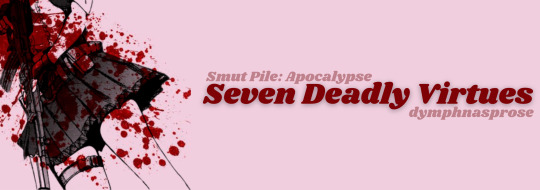

paring: kenny ackerman x fem!reader
genre: apocalypse!au, smut, dark content, 18+ mdni [cross-posted to Ao3]
word count: 3k
overview: kenny *i-wouldn’t-fuck-you-if-it-was-the-end-of-the-world* ackerman; but it is and you do . . . and you’ll probably do it again. or, if you read beyond the cut and wind up in hell that is legally not my fault.
tags: dymph does sacrilege once again, post-apocalypse au, blood, violence, zombies (only mentions of gore nothing specific), somnophilia, noncon, dubcon, degradation, smoking, insertion, sloppy oral, big age gap aka kenny is a nasty old man and reader is a sweet little virgin.
a.notes: happy *fucking* easter. this is for the smut pile’s apocalypse collab so go give everyone’s pieces a read, everyone has worked so incredibly hard. this is dedicated to @pleasantanathema, who was both my beta reader and emotional support while stringing this together. here’s to the old man fuckery, cheers.
hymn: the seven deadly virtues - camelot

But stay awake at all times, praying that you may have strength to escape all these things that are going to take place, and to stand before the Son of Man. -Luke 21:36
* * *
Wet.
A sticky kind of wet. Clinging on like thick clay, splattered across your neck— gore and sinew wrapped in a noose. Shades of decaying reds and browns are all you see these days.
The seeping, molding kind of wet.
The smell is suffocating, the toll of death deep in your bones. You keep moving, you have to. One foot in front of the other, fingers fretting with the cross hanging between your collarbones. Counting your Hail Mary’s distracts from the ache in your soles and the burning feeling that you’re rotting away.
It was slow at first. The end of the world, the crashing, clattering end felt like a slow decent to hell. Pieces of the modern world falling away, the promise of tomorrow, the assurance of a cure. You refused to believe the dead could walk the earth until they were stumbling straight towards you.
All of us, you think, are rotting away.
“Pick up the pace, kid. Are you trying to end up like the rest of those fuckers?” His voice rings from a few feet in front of you. The brush under your feet is dry, leaves crunching loudly with every weary step forward.
Kenny always likes to remind you of your naïveté, insults about your rose tinted glasses barked crudely from around a cigarette. Your youth, your optimism, your beliefs-- useless traits in his opinion. What good is God in a world like this.
“Friends. They were our friends.” Your words come out in a whimper, the tone further irritating the man ahead of you.
He stops, turning around to catch your eyes, gaze piercing through the night like a knife. All that’s left of your composure is used to keep from crashing right into his chest.
“Ain’t no more room for friends in this world, baby doll,” a long pointer finger lifts your chin, the slightest touch still bruising, “thinkin’ like that is what’s going to get ya killed.”
Rose tinted glasses, cracked and splattered with blood, fall off and are lost to a world that no longer exists. Kenny let’s up and turns, pulling you farther into the thick brush. You could swear you feel the lenses as they splinter under your shoe.
* * *

Kenny is a vile man. He knows his name isn’t on a reservation list at the Pearly Gates, he’s aware that a sinner lives on borrowed time.
Nowadays, everyone is living on borrowed time. Even you.
You, he thinks, looking back to where you stumble over a tree branch, far to good for a world like this.
He can’t help but laugh, the absolute absurdity of his current situation. Escaping death by the skin of his teeth, watching any familiar faces burning in the remnants of a camp he couldn’t really call home. People that fought to the bone, melting or devoured or both.
And then there was you, standing in front of the flames, tears falling down the apples of your cheeks, stiff in shock and horror. He remembers the way your lips moved, mumbling a quiet prayer instead of trying to run. Stupid little thing.
It’s not the earth the meek inherit; it’s the dirt.
Was it pity that made Kenny pull you away from an infernal gravesite all those months ago? He’s never the hero of any story. No, it must have been something else.
Maybe it was the way you looked up with teary eyes, silently begging for help. Unwittingly making a deal with the devil. His teeth grind at the memory, the vision of how beautiful you look so completely helpless.
Kenny leads and you follow, he hunts and you flitch at the sound of an arrow piercing flesh. The small squeak and proceeding thumb of meat as it hits the ground never fails to make you sick. When he’s not hunting for food, he’s hunting something else.
The sounds of death are all the same.
Some days you’re lucky, coming across abandoned hideouts or deserted cars. Snagging whatever hasn’t already been picked over; some ammo, the occasional can of peaches or pack of cigarettes. Kenny laughs dryly everytime, chucking the carton into his bag. Always the cigarettes, never the lighter. Most days, not so much.
Every night, you fall asleep to the flicker of a campfire, lulled by the steady sound of Kenny’s knife as it scrapes against a piece of wood. He’s always the last asleep. The woods are a dangerous place, the possibility of monsters circle at every moment. Under the veil of night, anything could happen. And it does.
He wipes his mouth, settling back into the harsh ground below him with a pleased hum. Your whimpers have settled back into a light snore.
Kenny is a vile man, and you’re too concerned with the lifeless villain in the shadows that you forget about the one sitting on the other side of the fire.
Three months of waking up to aching limbs and misplaced panties can’t be a coincidence, can it?
* * *
“Well ain’t this something.” Kenny pulls on the door, swinging it open with a loud creek. Your neck strains to look up at dark wood and steepled roof, the tall building hidden by dense forest, you two must be the first people to step inside in months.
“A church.” You’d find comfort within these walls if you weren’t so positive that God had abandoned this world.
Statues of the Virgin Mary and Saint Joseph are empty behind their stone eyes, shadowed with an unsettling shade of red from the stained-glass windows. The moment is a time capsule, a vision of the congregation of saints bathed in blood.
A chill runs down your back, counting every vertebrae.
You push down the unsettling foreboding, focusing back on the instincts to survive instead of lingering on a religion that you can no longer make sense of.
“Hey kid, over here.” You pick up the pace, quickening footsteps away from holy symbolism and towards Kenny’s voice. You walk into the closest room off a dark hallway and find him leaning against the doorframe. The rooms are getting darker with the vanishing sun, but you make out shelves of cans and boxes, food, blankets, clothes.
“I bet they used this as a food pantry,” Your comment was probably an obvious assumption, but Kenny just hums in response, “there’s enough here to last up months.”
Good samaritans in the first life are a saving grace is this one. Your cynicism lifts from heavy shoulders for just a moment. The lines between luck and divine intervention are fuzzy at best.
“I saw a well right outside too. Water’s probably cold as ice but it’s better than anything we’ve come across yet.” Kenny’s voice is even, but you swear he cracks a smile.
He was right, the water is cold enough to shatter your bones like ice. You shiver and chatter, teeth threatening to crack, but the feeling of being clean has you dumping bucket after bucket over your head. The grime and grit of your reality running down to seep into the grass below.
There’s no home to run to after the world ends, but water and food is more than you could imagine in recent months. Shuffling through boxes of donated clothes, you find a shirt big enough to sleep in. The fabric smells like moth-balls and dust, but the feeling of clean cotton against your skin is heavenly.
You find Kenny in the clerical office, rummaging through the priests desk. The sun is replaced with a flight of candles, for the first time in forever, you don’t feel like death is standing right behind you.
“Would you look at that,” Kenny pulls a cigar from the desk, bringing it up to his nose for inspection, “Looks like father had his own little habit.”
Despite yourself, you laugh at his comment, rounding towards the large leather chair he’s settled into.
“Smoking kills you know.” You lean against the desk next to him. Your bare legs brush against his knee, the heat from your skin makes his mouth water.
“I think there’s more pressing concerns than tobacco, kid.”
There’s something different about tonight, even more than just the four walls and roof around you. There’s something about Kenny and the way his stare has followed you all night. You can feel a cord pulling taught, fraying in the middle before it snaps.
“Asshole.”
The plush of Kenny’s bottom lip is close enough to your cunt to be disastrous. Friendly banter becomes laughing and swatting at his chest like a teenager. Communion wine and tension pulling you into him. The loneliness of this life becomes more apparent the closer he is to touching your skin. When did the man in front of you make your heart race so fast?
Maybe you’ve always felt this way.
You feel it, the ghosts of last night, the night before. The ghosts of weeks or maybe even months. The familiarity of a touch you weren’t quite awake for.
Ass arching off from where it sticks to the cherry wood, you want to feel it again. The laving of tongue and mouth against you. The devouring of your most intimate planes of skin, places no one else has ever touched before, places you were saving for your future husband.
The kiss as hot as hell.
“Awe, c’mon now,” His nose nudges against your clit, the movement pulling another cry from your throat to bounce against the high ceiling, “that’s not my name.”
“I’ve been tracing it into this precious cunt of yours every night,” each word is more unhinged than the last, no longer worried about the doe in his sights running away, “Do I need to spell it out for you again?”
There’s nowhere to run, pressed in between his canines.
Dreams of calloused fingers and a wandering mouth are now cementing as memories. The feeling of rough facial hair. The sounds of desperate moans and how they shake against you.
The way his tongue curls like a signature.
His mouth is flush against you again, sucking at your aching clit for only a moment before moving his attention to long lashes against your clenching hole.
“You must remember. You were moaning it so sweetly,” he nips at your puffy lips before drawing back. His chin is sheened in your arousal, slick refracting off the dimly lit space between you, flickering candles outline his features with a dance of orange shadows. Kenny’s eyes hold you captive, giving you one more chance to answer.
“What’s my name, kid?”
His tongue breaches you, a set of large, familiar hands keep your legs spread wide atop the desk.
You remember— of course you do. You remember everything. The name stuck in your head like a broken record. The name you call for in a sleepy haze as your body is dragged into orgasm.
The name that’s spelled against you like a promise.
“K-Kenny please.”
That’s all that he needs, the only thing, if he’s being honest, that he’s ever needed.
“There’s my sweet little girl. Finally using your manners.” Two fingers come up to swipe against your pussy, stopping right before your clit and collecting slick to bring up to your eye line for inspection. You jump when the warm digits drag against your bottom lip, a silent prompt for your mouth to fall open.
Kenny sticks his fingers in, the intent to make you gag is clear but you take it. You’ll take anything he gives you. Your tongue swirls around the intrusion, running against each joint and suckling loudly. The sound is wet and lewd, the spit collecting at the corners of your mouth makes his head spin.
Your destruction, he decides, will be beautiful.
Kenny’s fingers release with a wet pop. He runs callouses down from your cheek, over the curve of your tits and down your abdomen. Two fingers stop at your pubic bone to trace lightly against the skin in random patterns.
“Your body is just as agreeable when you’re awake.” His words drip in sin, reminding you exactly how familiar he is with you. All of you.
Both thumbs come down to spread your lips, Kenny can’t help but take a moment-- just a beat-- to stare at your swollen, glossy clit and the quiver of your little hole. Your skin is soft, completely untouched by anyone else. He laid claim to almost every inch before you begged him to.
He sinks from the leather chair, kneeling in front of you. You’re the body and blood as far as a sinner like Kenny is concerned.
There’s a plea stuck in your throat. You want to beg him to slow down, it’s too much all at once, but you know if you cried out-- all you would do is beg him for more.
His tongue is long and flat against you, every swipe is punctuated with a growl. The rumbling from his chest is thrown against your clit like a current through cold water. Sharp, shocking, terrifying.
“Kenny, I- I want,” He sucks your throbbing clit into his mouth, rubbing the tip of his tongue against the hood. There’s no words in any language that make sense to you. There’s nothing but his name.
“Kenny ah, I need, I don’t know how t—”
Your dangling over a fire, trying desperately to jerk away from the lick of the flames.
“I know, kid, I know exactly what you need.” his breath is heavy and warm in fans across your skin. You're dripping down the sides of his face and onto the cleric’s desk. Kenny is covered in you, open mouthed kisses against the sweetest thing he’s ever had in his mouth. The tangy taste of your pussy mixing with the wine still on his tongue.
If he spent forever between your thighs, it wouldn’t be nearly long enough.
“Such a sweet little thing, you’re insatiable.” All you can do is nod dumbly, eyes glazing over with a distinct look of teary submission. It’s so new to you, but grinding upwards and catching your clit against his chin seems like second nature.
The primal need for release is much stronger than any prayer of abstinence.
“What would your little prayer circle think if they knew you spread your legs for a dirty old fucker like me?” Kenny coos against the apex of your thighs. His words knock on the hollow space behind your breastbone.
Your family and friends, the priest from St. Mary’s who baptized you, old man Jaeger from next door— all buried or burned to ash or so much worse.
Anyone you’ve ever loved is dead, maybe that’s why Kenny is still around.
There’s nothing that can hold you back anymore, the control you claw at slips from your fingers like watery silk. There’s no escaping the roughness of his stubble and an evil, serpent tongue.
“Kenny!”
You cum with a shattering cry, the sound ringing so loud in your ears you swear any enemy of the living in a 10 mile radius could hear you. In reality, what escapes is little more than a broken snivel.
It hurts, muscles aching from the exertion of trying to keep from falling apart. Your body is a hairpin trigger, the comedown feels more like withdrawal.
“There’s my girl, my good little girl.” His voice is uncharacteristically soft, doting while you fall back to earth. It’s a strange feeling, you’ve never found comfort in Kenny before, he isn’t the shoulder you go to lean on.
But tonight he’s the chin you buck into.
The aftershocks run across your naked skin, already missing the feeling of his touch as he settles back into the cracked leather chair.
His cock presses into the denim confines uncomfortably, the ache can wait though. Whether this is his last night alive or has all the time in the world-- he’s going to savor the glistening prize nestled between your thighs. Kenny’s fingers find the cigar where it lies next to your knee, bringing it up to examine while you squirm at the cold night air against your wet cunt.
“No one will ever make you feel as good as I do,” both legs kick out, falling to dangle on either side of his knees in surprise as the cigar comes down to trace your outer lips. He presses the tuck inwards, pulling out slightly so you cry out. The harsh texture of the wrapper mixes with the most minimal of stimulation, causing tears to clump in your waterline.
“Why don’t you think of a way to repay me, hmm?”
You push past the heaviness in your muscles, sitting up to meet his incredulous stare. Kenny sticks the cigar between his teeth, striking a match from the desk drawer to light the cap. The cigar is stale, cheap tobacco. But every drag now tastes like you.
“I- I could try to--” Words are left unspoken on your tongue, even now, the intonation is poison in your throat.
You expect Kenny to laugh at your bashfulness, instead, two fingers come up to curl around the Rosary around your neck. He drags you forward, exhaling smoke into your parted, quivering lips. You try your best not to choke.
He pulls the cigar away, ashing it carelessly on the floor.
“Use your words, kid, tell me what you want.” His words are sleazy but his voice is soft around the edges. Prompting you to shuffle onto his lap. His free hand rests in the small of your back to keep you steady.
“I want--” Fuck, your voice feels like it’ll fail, you take a moment to breathe, “I want you to fuck me, Kenny.”
Your plea is rushed, so quick to hit his ears he almost misses it. There’s no hiding anymore, there’s nowhere else in this world but the private quarters of a long-dead clergy member. The space between you and Kenny is foggy and tense, only inches between lips.
There’s no more penance in this world, no more time to sit and atone for his sins with prayer. The soft, syrupy feeling of your cunt wrapping around his cock is a slice of heaven, cut out and stolen right from the sky.
“I thought you’d never ask, doll face.”

✞ all writing is dymphnasprose’s original content, please do not repost or modify. do no read my content as asmr.©️

#aot x reader#aot x reader smut#aot smut#kenny ackerman x reader#kenny ackerman smut#the smut pile: apocalypse#tw: somnophilia#tw: noncon#tw: dubcon#tw: blood#tw: sacrilegious#sin.somnophilia#sin.noncon#sin.dubcon#sin.blood#sin.sacrilege
728 notes
·
View notes
Text
The Half Demon Series
The MC gets dropped down into the Devildom and- oh my, it looks like Lucifer’s a father!
Season 1
MC is Half Demon and They Look Awfully Familiar Part 1
MC is Half Demon and They Look Awfully Familiar Part 2
[Lessons 1-5] [Lessons 5-6] [Group Retreat] [Lessons 10-12] [Lessons 13-15] [Lesson 16] [Lesson 17] [Lessons 18-20]
Season 2
MC is Half Demon and They Look Awfully Familiar Part 3
Season 2 Prologue Lessons 21-22 Lesson 23 Lesson 24
MC is Half Demon and They Look Awfully Familiar Part 4
Episodic Fics
The Obligatory “THEY GOT TURNED INTO BABIES” Fic
The Obligatory Beach Episode
A Day at the Demon Lord’s Castle
Father’s Day
Nightmares
Sleepovers at Luke’s House
Father’s Day Year 2 (with the Hell Timeline kids)
A Forgotten Birthday
Father’s Day Year 3
Crack/Extra Content/Personal Headcanons
The Kids’ Names
Purring Headcanons!
L!MC’s Glasses
L!MC and Luke, Besties Forever!
L!MC Gets Kidnapped and is SUCH an Asshole About it [1] [2] [3]
A!MC and Luke are Disney Princesses in Training
First Demon Form Designs
Reference Art! [Cecil] [Ash] [Venus]
Are the Kids Immortal Like Their Dads? (Yes)
The Kids’ Room Situation
Luke and L!MC Birthday Comic
The Kids in Fancy Outfits
The Kids and Cerberus [1] [2]
The Brat Brigade Visit and Arcade
Cuddle Sneak Attack!
Hugability Scale
Communion Wafers are Delicious Okay-
Search History
Kid Shennaniganery [1] [2] [3] [4] [5]
The Kids Visit Himiko‘s Timeline [1] [2]
The Hell Timeline (All the Fankids Exist)
The Non-Canonical Kids [The Remaining Brothers] [Diavolo] [Barbatos] [Solomon]
Percy and Admiral Levi!
The Kids and their Tragic Backstories
Diavolo and Darius, and Barbatos and Tulsi
The Hell Timeline’s purring :3
259 notes
·
View notes
Text
So I don't knwo if anyone will actually ever read this. Maybe if I post it one day but who knows. But hi.
I'm Julian. T in a 21 year old transgender aboriginal guy. from the small town of G.H.M Austraila. And this is my life story.
I was originally born Tareena with a different middle and last name. July is my birth month. And I was born in 2000. I was a very sick baby my mother was in labour for 36 hours with me. I am her first born.
I got really sick becuase I had fluid in my lungs, I was lucky that I survived, But I did. I don't remember much of my younger childhood other then my parents fighting. My father was my mother's drug dealer back in high school. And she was daughter of the local police chief.
I remember my first ever day at school. I was bawling my eyes out and I had the most horrendous shade of red lipstick smeared on my lips.
That was the year I met my best friend for life/my brother from another mother. His name is Ben. He was the only one I really liked at school most of the other kids didn't get along with me. But I had him.
He has been there for me thought everything. When I had just turned 7 my aunt and uncle got married. It was a beautiful wedding. But if only I knew what it entitled. That was the same year my parents broke up and more.
That was the year alot of stuff started. The sexual abuse and molesting from my uncle. I still remember it all very vividly to the point I can walk though one go the buildings today and point out exact spots where he would hide with use to touch us.
I was lucky, my cousin walked in on us when my uncle was going to go further then he normally did. If it was for him at that time I most likely would have been raped.
I didn't really understand but I knew something wasn't right. He use for make us watch porn with him and it still makes my skin crawl.
I like to think things work thought karma and luck. One day I stayed home from school becuase i wasn't well had. Avery bad fever. And mum had to work. (She worked 6 jobs to support three kids after her and my father divorced.) She had left the Tv on for me and I was skipping thought channels. A really pretty actress who I don't knwo the name of came onto a talk show, and I watched it. She takes about what had happened to her when she was 10 playing as a child star of a show.
She shared what had happened with her producer. How he black mailed her and sexually assaulted, abused and raped her over the years she was their. She talked about she wish she had the courage back them to tell someone. And that if she could be the courage for someone else suffering then it means what she went thought would mean something.
It hit me hard and I believe she gave me the courage to do what I did. It scared the shit out of me. But one day I was told by my mum I had to go and stay at my uncle's for the night and I was terrified. I tried talking my way out of it by asking to go to friends places but in the end I couldn't.
My mum asked me why I really didn't want to go and if something had happened. I told her not to be mad at me and told her what my uncle had been doign to us. I told her about how he's make us strip down and lay on a bed so he could look over us like we were fucking meat. And I let it all out to her.
She was horrified. Had to calm me down and ask me if what i was saying was true. I told her it was and front there alot of shit happened that day. My mother nearly killed 'Darren' she had to be locked with us at the police department while they talked with my sister and I.
But we were too young and didn't know how to explain everything. If their is one thing I can tell you is teach your children the real name a of their genitals otherwise police won't do anything.
It was a big battle trying to get him charged my mother wanted him locked away. But sadly nothing every came of it.
We got older and I ended up spending more time with my great grandparents. My great grandfather was my world we shared a birthday of a sort with his a few days before mine. I'd see him when ever we could.
School got harder after my nana passed away. And I took up Catholicism. (Not the best choice on my part) I was 12. I did my communion and such. But after that mygrandfather moved closer and I used to spend every school after noon with him watching old john Wayne and black and white movies.
He would tell me stories of his child hood and it some something I loved.
Once I got to high school my mental health and physical health deteriorated quite quickly. I had a really creepy boyfiend who was year 11 when I was year 8. After i broke up with him he started stalking me until my younger brother and mum got involved.
After that I cut ties with alot of my friends. I only had a small group. I picked up smoking with the stoners behind the science block and hall. They were chill and let me be me. But weed only helped so much. At first I thought I wa broken. All the other 'girls' were talking about how they were having sex, had boyfriends and such and I felt so out of place. At friend I thought it wa becuase of what 'Darren' did to me.
But then I met the coolest girl at school and my first girl crush. She had dark black hair cut almost buzzed she work rings and necklaces and didn't give a shit about the school code.
She was the one who taught me girl can like girls same as guys can like guys. I hung out with her all the time. And then one day she just stopped to school I felt like I didn't belong.
I got really depressed in my next few years. Alot more smoke. I lost 3 animals I had since childhood in 3 months. It messed me up bad and then we moved again.
I was still at the same school. And that we sheen I started my friendship up wirh a girl called 'Sam'. She was my best friend for long time. Becuase at that time Ben had gotten a girlfriend. One I didn't get along with at them time but it wa becuase I thought she was a popular kid and that she was going to take my best friends away from me.
I was very unstable. I just selfharmed but not in ways that people could tell. I used to smash rocks into my head and burn my hands and feet with lighters. It made me feel more alive at the time.
It got worse once I came home with my now cat. He was 3 weeks old and I was feeding him milk off my pinkie. My step dad at the time lost his hair and fucked my mental health up even worse. I told my mum to get rid of the Cat and that when she ended up finding other newer injuries on my. I.. I had tried to rip my arms open with the sharp end of a potato peeler. Not my best moments but I can look back on it husband laughs nd how stupid I was.
Alot of stuff went down from when I as 13 to 14 wobbly step dad. But mum loved him and he never raised a hand to hurt up just he would tell alot, drink and do lots of drugs.
When I was 14 I had my first kiss with a girl. My first girlfriend and it was the best thing ever. Until she broke up with me over text.
8 notes
·
View notes
Text
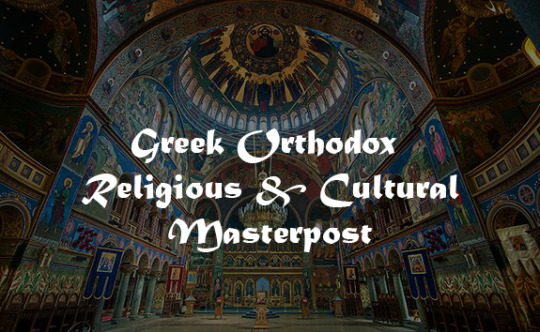
This post is based on my knowledge of traditions of the north and center mainland of Greece. However, I am pretty sure most of those things apply to Greek Orthodox people universally. Needless to say, each village and town can has its own local traditions when it comes to religious occasions.
I am a Greek Orthodox living in Greece, raised into the religion.
I will translate some phrases directly, hoping to give a more “raw” meaning.
If you are not sure you understood about certain information in the post, feel free to ask me on Tumblr!
Google Drive Link for the post in .docx format
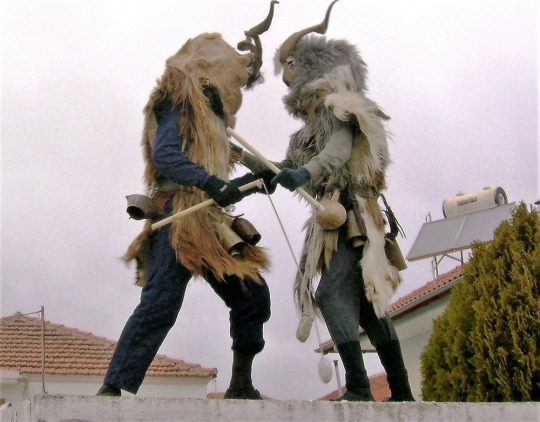
Table of Contents
Philosophy.
The Church as a building and as a center of faith.
Chapels and even smaller churches.
The Communion.
Livanisma / Thimiama – Incense burning.
Home Altars.
Clothing.
Komboskini - The prayer rope.
Tama - Votive
Crosses in high places.
Wedding
Baptism
Wedding & Baptism.
Burial customs and honoring the dead.
Agiasmos - Blessing.
Protomaya.
Martis - The protective bracelet of Spring.
Easter Traditions.
Vasilopita on Christmas
Kalanda
Mount Athos
Pilgrimage to Tinos
The Catching of the Cross
More customs
Random Information
1. Philosophy
Love and Forgiveness are the main pillars of the faith. Some people follow the Bible to the letter, others pick the parts that think reflect our age and most of people keep the general message of the teachings. The Holy Texts are interpreted differently by different people and there can be contradictions in lifestyles and believes. However, the notion that having love and forgiving is what makes you a Christian is widely believed.
Anyone who does not love does not know God, because God is love. - 1 John 4:8
Love is patient, love is kind. It does not envy, it does not boast, it is not proud. It does not dishonor others, it is not self-seeking, it is not easily angered, it keeps no record of wrongs.- 1 Corinthians 13:4-5
There is no fear in love, but perfect love casts out fear. For fear has to do with punishment, and whoever fears has not been perfected in love. - 1 John 4:18
Don’t say ‘I am hated, and that’s why I do not love‘. For this is why you out to love the most. - Ioannis Chrysostomos
“But I say to you who hear, Love your enemies, do good to those who hate you” Luke 6:27
“Do not judge, and you will not be judged. Do not condemn, and you will not be condemned. Forgive, and you will be forgiven.” - Luke 6:37
"Then Peter came to Jesus and asked, 'Lord, how many times shall I forgive my brother or sister who sins against me? Up to seven times?' Jesus answered, 'I tell you, not seven times, but seventy-seven times.' " - Matthew 18:21-22
2. The Church as a building and as a center of faith
Jesus and the Apostles gave us some directions for the worship but most of practices, as well as the architecture of worship came from the Greeks themselves. I jokingly say that Greeks are low key pagans, because religion didn't change the culture. (It did, but only a bit). Christians first worshipped inside the old temples of the Hellenic gods (the Parthenon was once the temple of Virgin Mary) and they built their first churches in that style. The architecture changed with time but it still carries the mark of ancient temples.
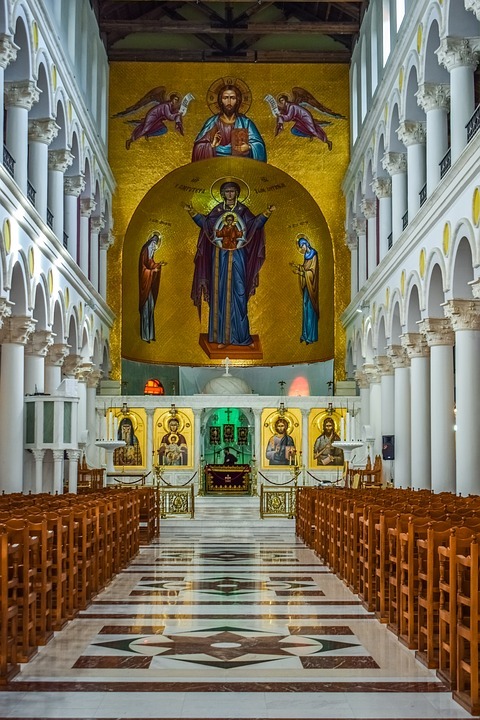
Agios Demetrios Thessalonikis
In this link you can view the different styles of architecture for Greek Orthodox Churches. (Link)
In Orthodox churches you don't have to have a feeling of the dominance of God, like in the Catholic or protestant churches, but a feeling of warmth and belonging. In the hall you can buy a candle to light on a display of candles in the hall, to get a blessing for yourself and the soul of anyone you want. Nobody supervises you there.
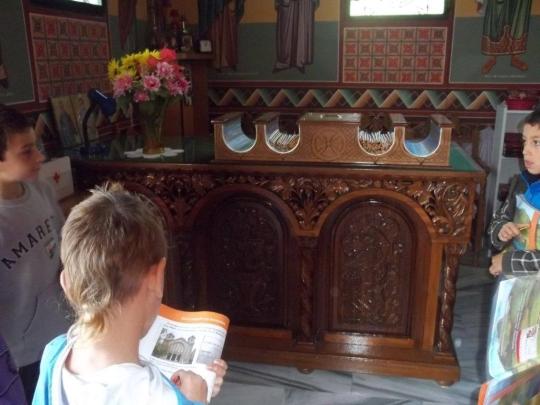

You can also not pay but I haven't seen anyone not giving money, so far. After that you kiss all the icons displayed in the hall and cross yourself.
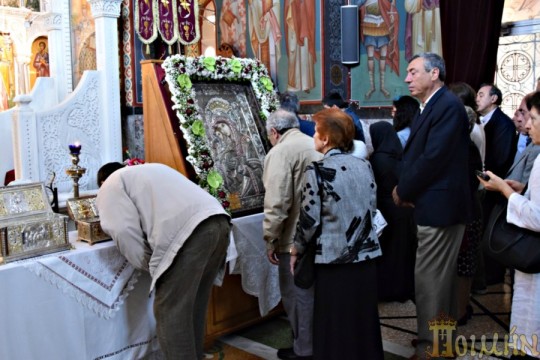
As you enter church, men on the left side, women on the right. There is also a special place for women, an interior balcony which is really cool and women go there if they want to. Nowadays man and women can go there.

3. Chapels and even smaller churches
Chapels serve the same purpose as churches but liturgies rarely happen in them. You can get married in them sometimes.
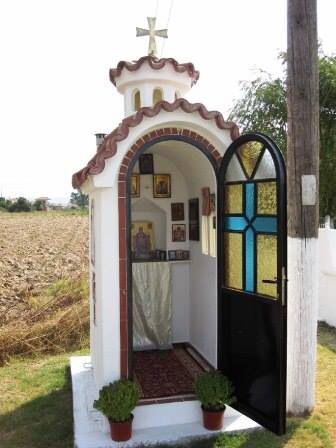
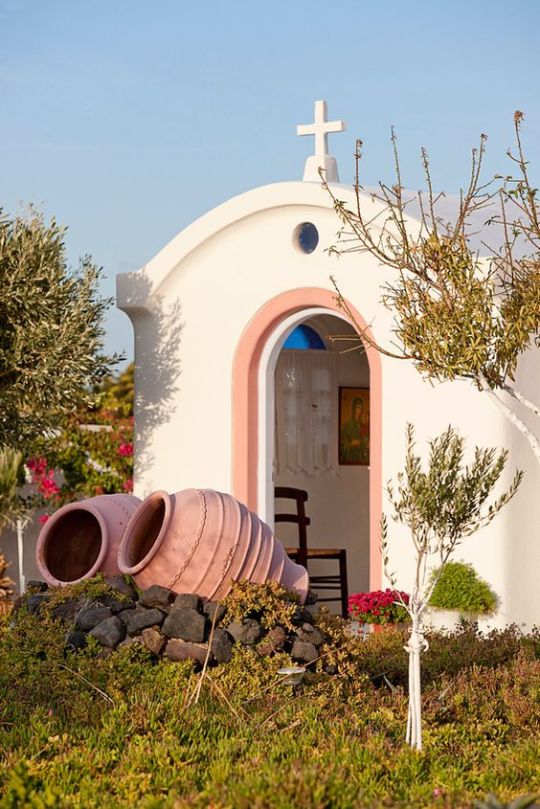
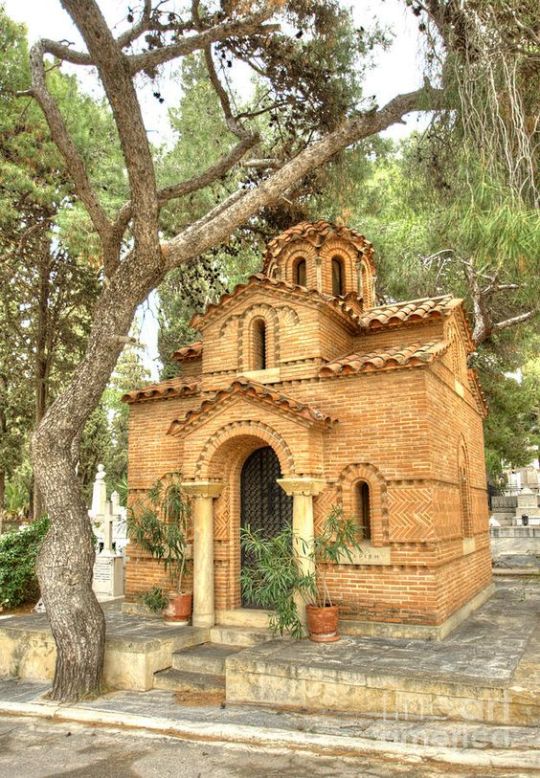
They can be carved in stone or into a cave - even in a tree or in between multiple trees.

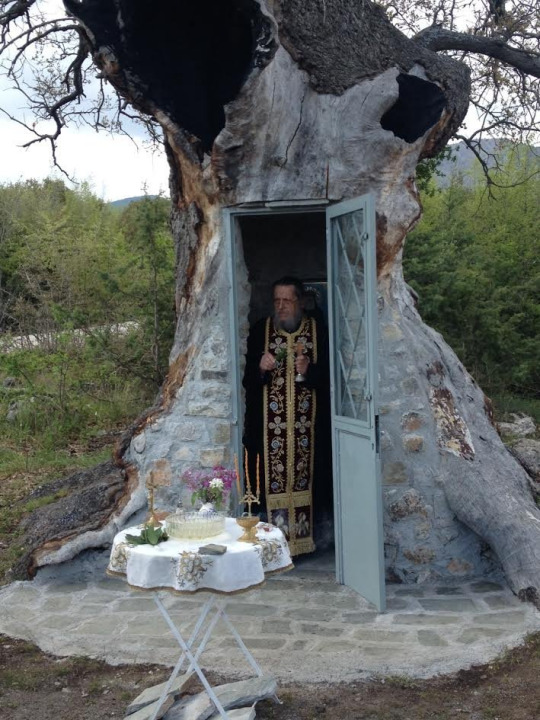

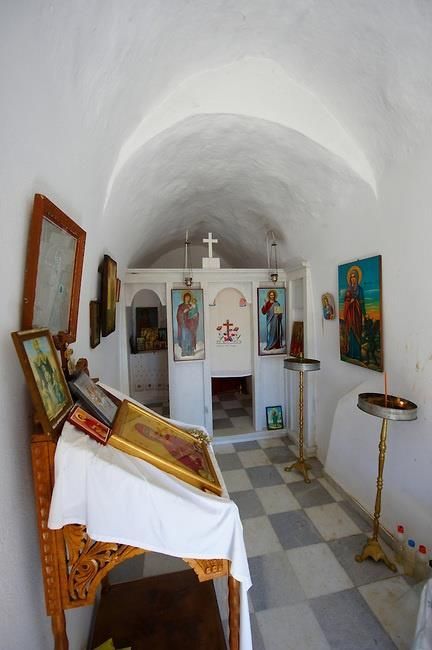
The also exist in big hospitals to bless the patients and invite people to pray for their sick.
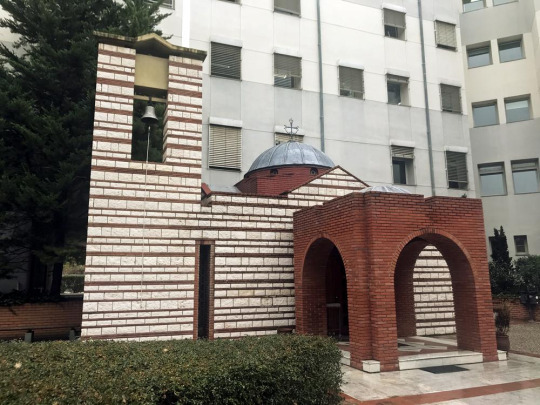
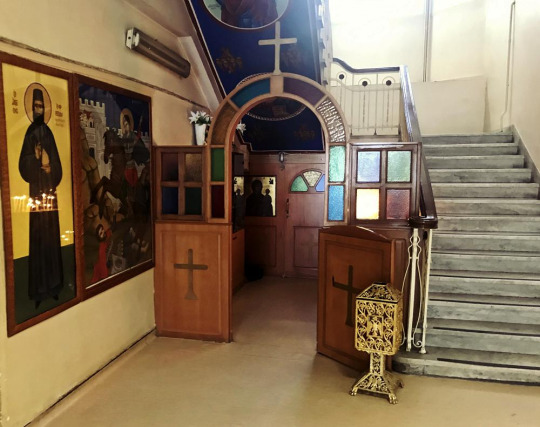
They can be seen in some big hotels, too!
But the churches can become even smaller!
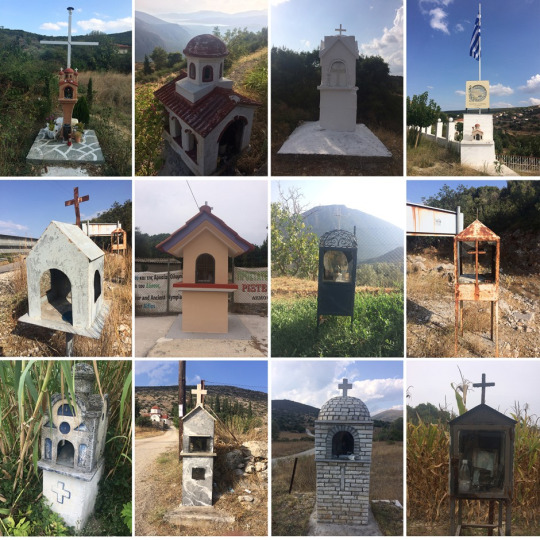
Traveling the roads of Greece you will see dollhouse-sized roadside chapels. Some are elaborate little things made of terracotta or even marble, plonked in the middle of nowhere, high up in the mountains; no village or houses for miles, and yet impossibly, most of them are faithfully maintained with a candle always burning inside.
There’s a number of reasons for these heartfelt shrines, some as old as the roads themselves. Placed by the roadside, an initial assumption is that they’re built to remember a victim of a traffic accident victim, and sometimes this is exactly the case. But just as often, shrines will be built by survivors of accidents, thanking a saint at the location of their ordeal.
They can be found in home yards of people who want to come closer to God
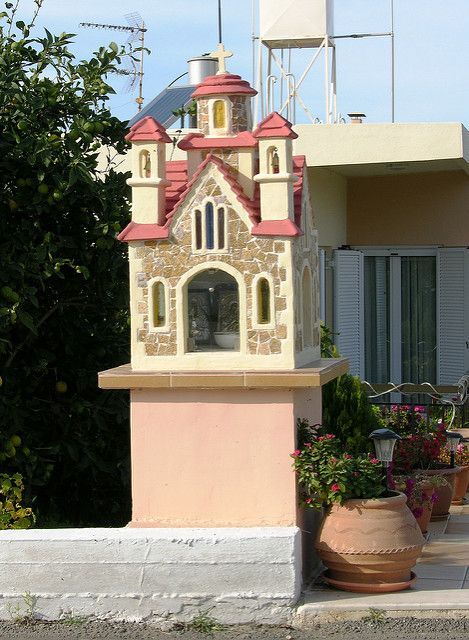
4. The Communion
We all take part in Communion with the same spoon. The Communion has bread crumbs in. Even babies drink a tiny bit of the wine (blood of Christ). Traditionally you were "unpure" if you had your period - others believed the blood of Christ would come out of you as period blood if you drunk it, so generally getting the communion during your period is a no for many.

5. Livanisma / Thimiama – Incense burning

Today, Orthodox Christians use incense throughout the church services. The priest “censes” certain areas at certain parts of the liturgy. The incense is placed inside a device known as a “censor”, which is fairly ornate in appearance and has bells on it so that we not only smell the fragrance, but hear the jingling sound as the priest uses it. This action is meant to remind us that are prayers are rising to the heavens to be heard by God.

Typically in the Orthodox Church, dried incense cones are used. In order to provide the heat needed to allow the cones to burn, a special type of charcoal is used. You also may burn resin, such as Frankincense or Myrrh, directly in an incense burner using charcoal without taking the extra step of mixing it with a binding agent.
Churches often get their incense from special suppliers and maybe even monasteries where the monks or nuns make their own. Typical scents that are used include Frankincense, Myrrh, and Rose.
The believers can also burn incense in their homes and say prayers to ward of Evil.
6. Home Altars
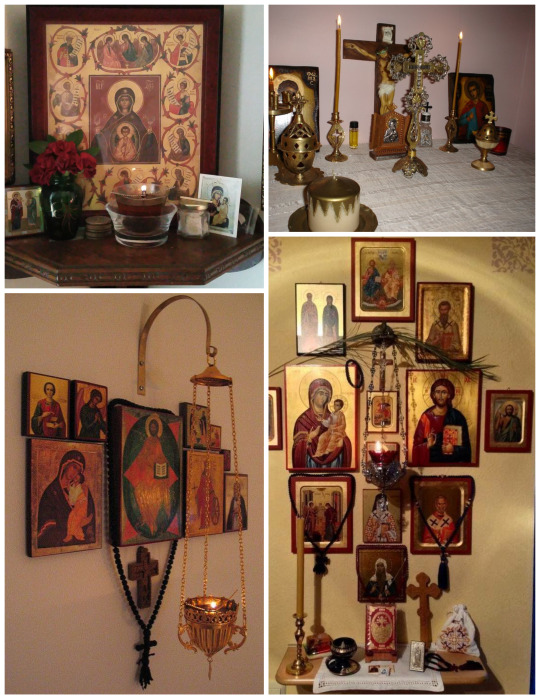
An Orthodox Christian is expected to pray (to be connected with God) constantly. According to Bishop Kallistos Ware, "In Orthodox spirituality, [there is] no separation between liturgy and private devotion." Thus the house, just like the Temple (church building), is considered to be a consecrated place, and the center of worship in the house is the icon corner.
An icon corner is normally oriented to face east. It is often located in a corner to eliminate worldly distractions and allow prayer to be more concentrated. Here is where the icons that the family owns should be located, normally including at least icons of Christ, the Virgin Mary, and the Patron Saint(s) of the family.

An oil lamp normally hangs in front of the icons. The careful trimming of the lamp to keep it burning at all times is interpreted as symbolic of the attentive daily care faithful Christians should take over their souls. Relics of saints (if the family possesses any) and a Gospel Book and a blessing cross would be kept there, as well as incense, holy water, palms and pussywillow from Palm Sunday, candles from Pascha (Easter), and other sacred items, as well as a personal Commemoration Book (containing the names of family and loved ones, both living and departed, to be remembered in prayer).
7. Clothing
People should enter the church in modest attire. No shorts and no short skirts. Women don’t need to cover their head. In fact, almost no woman under 80 covers her head in church.
With special occasions being the exception, Greek Orthodox Priests wear a black himation because of the fall of Constantinople. They wear it all the time, even to grocery shopping. They have long hair and beard. In rare cases you will see women dressed with a long black cloth - something like a burqa but the whole face is uncovered. They are nuns or devoted to Christ.
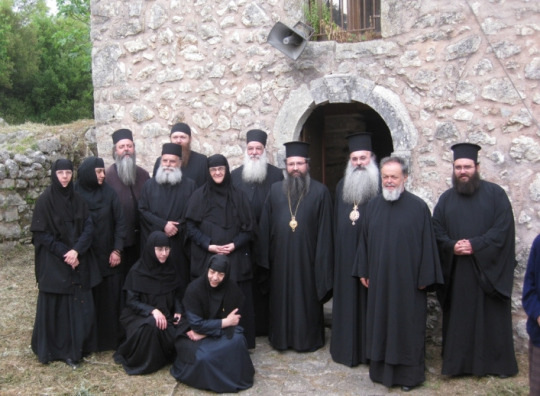
8. Komboskini - The prayer rope
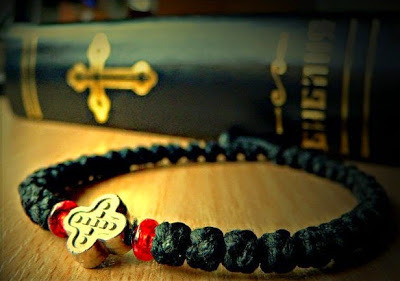
The prayer rope, known in Greek as a κομποσκίνι (komboskini), has long been a powerful weapon for the Orthodox Christian. It has a very simple design, but is filled with meaning. The rope typically comes in one of three lengths, 33 knots, 50 knots, or 100 knots, though there are some in use which are as long as 500 knots. The 33 knots of the shorter rope symbolize the 33 years Christ spent on earth.
It is used in conjunction with the Prayer of the Heart. On each knot is said, "Lord Jesus Christ, Son of God, have mercy on me, a sinner." This prayer is occasionally shortened to, "Lord Jesus Christ, have mercy on me," and other prayers are sometimes said, such as, "God be merciful to me a sinner." Prostrations can also be made with each prayer or after a certain number of prayers. By carrying a prayer rope on us discreetly, we are reminded to “pray without ceasing”.

The prayer rope is attributed to St. Pachomius (4th century). The devil would untie the simple knots he would make to count his prayers. Inspired by a vision from an angel of God, St. Pachomius was able to create a special knot composed of nine interconnected crosses (representing the nine angelic classes), that the devil was unable to untie.
9. Tama - Votive
Tama is a form of votive offering or ex-voto used in the Eastern Orthodox Churches, particularly the Greek Orthodox Church. Tamata are usually small metal plaques, which may be of base or precious metal, usually with an embossed image symbolizing the subject of prayer for which the plaque is offered.

The tradition comes from the ancient years, when Greeks offered metal or marble plaques to the gods, often for the cure of an ailment. Eyes may indicate an eye affliction, hands or legs may indicate maladies of the limbs, a pair of wedding crowns may mean a prayer for a happy marriage, etc.
Tama also means Promise. Usually the believers promise something to a saint in exchange for their help on something. My aunt made a tama to the saint Anastasia Farmakolitra ("saves through medicine") to change her name day from the day of the Resurrection to the day of Anastasia Farmakolitra's day if her daughter passed to Pharmaceutical School. Many promise to light big candles (Lambathes) as an offering to the saint or make a donation to their church. Making a lambatha in your height is a standard tama.
10. Crosses in high places
The Greeks want to feel watched over by the Divine but also leave their mark in the area they live. A way to show their devotion is to place big crosses in hills and mountains which overlook their city, town or village.
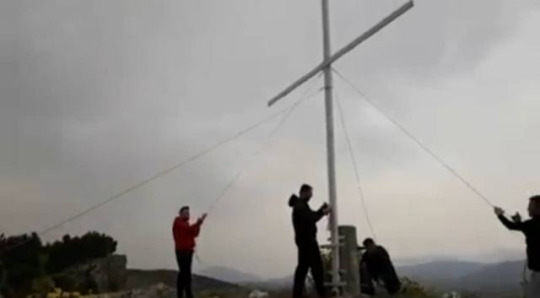
In some cases you find those crosses in high, remote places.

Some crosses light up at night!

11. Wedding
When the priest says "and the woman should fear the man" in a wedding, the bride may step on the groom's foot to show dominance.
In the bride’s shoe sole her unmarried friends write their names. The woman whose name fades first will be the first to marry
The relatives also put money into the shoe of the bride “so it can fit better“ - but really it’s just a gesture to give money to the couple
The Crowning is the highlight and focal point of the Sacrament of Holy matrimony. The priest then takes two wedding crowns (stefana), and blesses the bride and groom in the name of the Father, and the Son, and the Holy Spirit, and then places the crowns upon their heads. The Best Man or Best Woman then interchanges the crowns three times as a witness to the sealing of the union. People keep their stefana in their house and even frame them.
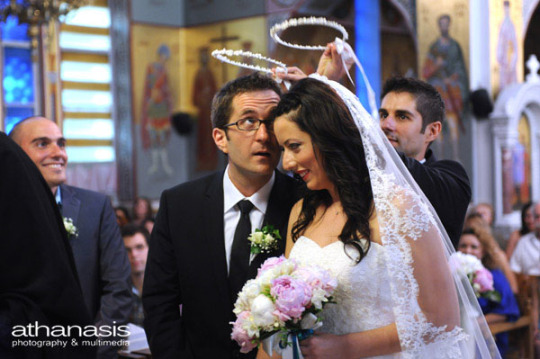
12. Baptism
Greeks take their names from their grandparents (since ancient years) and the name is kept a secret until the baptism.
It is a ceremonial moment because prior to the Christening, the individual is not yet part of the church family. In the church hall the priest asks the person to be christened to renounce Satan. If the individual is an infant, the godparent does it for the child. In the next major part of the ceremony, the person being baptized is immersed in the water three times, which is symbolic of Christ’s birth, death, and resurrection. The person is oiled - so they can be blessed and slip from the hands of Satan - and a tuft from their head is cut - to symbolize new beginnings, devotion to Christ and to give Satan less hair to grab them from. If baptized as an infant, after immersion the child is placed in the arms of the godparent with a white sheet, which symbolizes purity. Then, the child receives the sacrament of Chrismation.
The godparent gifts a golden cross to the baptized and, as long as the baptized is young, they buy them shoes for Christmas and an Easter Candle for Easter.
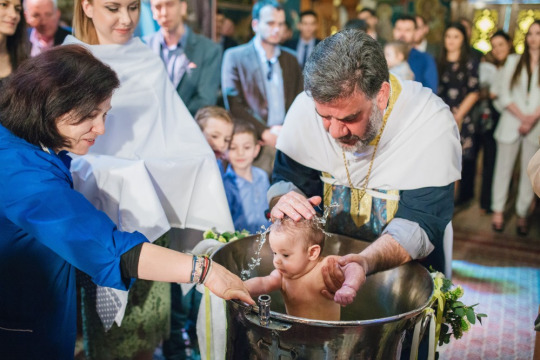
13. Wedding & Baptism
You can do a wedding-baptism to save money. First the marriage, then the baptism. If the child is about to die before a baptism gets arranged - God forbid - they get baptized in the air (and not in water) by a priest.
Koufeta (Sugar Coated Almonds) are mainly served in weddings but also when wedding and baptism happen in the same day. They are placed in little bags in odd numbers and are served on a silver tray. Odd numbers are indivisible, symbolizing how the newlyweds will share everything and remain undivided. Tradition holds that if an unmarried woman puts the almonds under her pillow, she'll dream of her future husband.
After wedding and/or baptism there is - of course - a feast with hundreds of guests.

14. Burial customs and honoring the dead
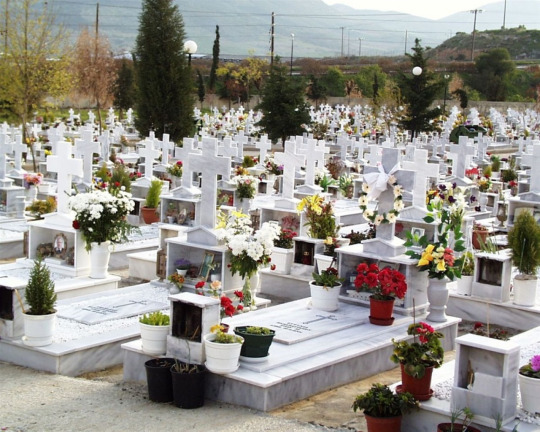
Pouring wine on the graves during the burial, as an offering or to prevent the dead from coming to life. (I am not sure but that is probably wine blessed in the church).
There is a feast after every mystery. Even funerals.There are more feasts for the dead as time passes. You have to do them in 3 days, 9 days and 40 days. You don't have to do all of them but it's showing respect to the dead and most people do them. 3 and 40 days feast are very important. For the 40 days feast - as for the funeral - there are flyers on the area, which invite people. When 1 year and 3 years pass you go to Church and the priest mentions the name of the dead in the blessings and later comes from the grave to chant.
During the Sabbath of Souls you have to bring koliva (wheat) to offer to the dead in the family. Supposedly the dead "feed" from them. So it has to be boiled!
Charon is the one who takes souls in our recent tradition.
Graves stones often have sketched pictures or photos of the deceased on them.
15. Agiasmos - Blessing
The start of the New Year in the tradition of the Orthodox Church is marked with the blessing of homes and businesses with Holy Water, or an Agiasmos (literally, to make blessed). This practice commences immediately following the Feast of the Theophany (the annual celebration and remembrance of the Baptism of Jesus Christ – January 6). This blessing is not something done for good luck or to prevent bad luck, but rather a blessing to help strengthen and protect.
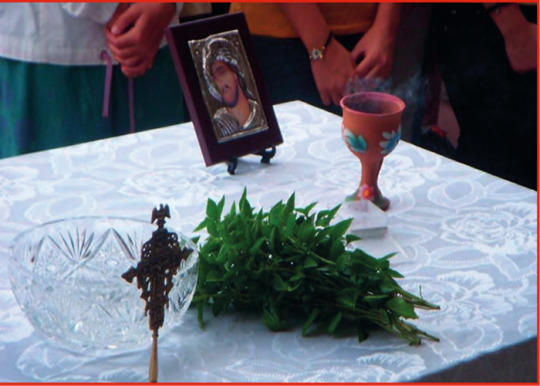
The following items are needed for the ceremony:
Small or medium size bowl, filled halfway with cold tap water
Small twig of fresh basil (floral kind)
Icon displayed behind the bowl
Hand censer, lit and burning incense during the service
The service is also provided in schools when the new school year starts. This is a particular occasion which can be annoying but also fun for the students because... water shower! Please watch this video (Link). I love it because the priest comes too close to the children - sometimes they want to bless too much - and the kids try to avoid getting wet from head to toe!
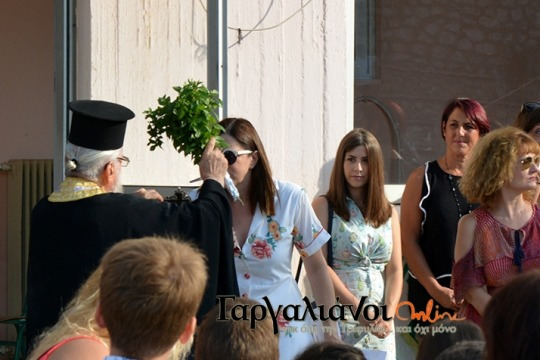
16. Protomaya
May, according to Greek folklore, has two meanings: The good and the bad, rebirth and death. The custom celebrates the final victory of the summer against winter as the victory of the life against death go back at the ancient years and accumulated at the first day of May. This day was also dedicated to the goddess of agriculture Dimitra and her daughter Persephone, who this day emerges from the under world and comes to earth. Her coming to earth from Hades marks the blooming of nature and the birth of summer.
Another ancient celebration that Protomagia has its roots is Anthestiria, a celebration in honor of Dionysos (the Greek God of theater and parties) a festival of souls, plants and flowers, celebrating the rebirth of man and nature.
The custom of May 1st is to decorate the doors of houses with flower wreaths in a way to welcome the power of nature into our home. The wreath is made from various flowers, handpicked and knitted together. In some parts of Asia Minor, people put on each wreath, except flowers, a garlic for the evil eye, a thorn to protect the house from enemies and an ear for good harvest. The wreaths adorn the doors of the houses until the day of St. John the Harvester (June 24) when all the wreaths of the neighborhood are gathered and burnt in a big fire, the fire of the saint.
See my hashtag #protomaya for more
17. Martis - The protective bracelet of Spring

It’s said it’s an ancient tradition dating back to the cults of Demeter and Persephone. Eleusis was the ancient city where the ancients performed secret rites for the cult. As a form of initiation into the cult, which was one of the Eleusinian Mysteries, the faithful wore a bracelet called a “kroki” around both their right hand and left ankle. Amazingly, the ancient tradition still lives on today in modern Greece. However, there are certain rules that one must abide by when creating and wearing the symbolic bracelet which celebrates the arrival of Spring.
Most importantly, the bracelet must be woven on the last day of February and it must be made of white and red thread. The white thread of the bracelet symbolizes purity while the red represents life and passion.
In ancient times, people believed that the bracelet helped protect the person who was wearing it from diseases, as well as the strong rays of the spring sun during the month of March. Today they say it protects from the strong rays but also the cold of March. Since it’s a transitional month you can burn from the sunrays but you also need wood for your fireplace!
Part of the ancient tradition in Greece calls for the person wearing their red and white “Martis” bracelet to take it off and tie it to the first flowering tree they see in March, in order to yield a healthy harvest and to keep the tree healthy.
Another practice with Martis bracelets occurs when the first swallow of the Spring is sighted. The first person who sees a swallow upon the bird’s return from its winter migration, ties their bracelet around the nearest rose bush to encourage the bird to make its nest there.

18. Easter Traditions
Easter is the biggest celebration of the Greek Orthodox tradition. The Holy Week, preceding Easter Sunday, is a time to ponder on Jesus’ Passion and Crucifixion. It is often regarded as an opportunity for body cleansing through fasting, visiting their town of origin and embracing local traditions.
We fast for 40 days (cutting more and more foods every week). Before the fasting we have Tsiknopempti when we eat as much meat as we want, to give our body what it needs before cutting it for 40 days. (It's sort of a celebration and people go out). University restaurants and private restaurants always have fasting options this period. The first day of the fasting is called Clean Monday and it's also like a celebration. It’s the first day we start eating “fasting” food and we also fly kites!
Kyra Sarakosti - Lady Lent

She can be made out of paper or dough. Lady Lent has seven feet. They represent the seven weeks of Lent. Each passing week, on each Saturday, children get to break off one foot. This is a great visual way to countdown the weeks until Easter.
Lady Lent has no mouth. The missing mouth symbolizes fasting. No consumption of meat, dairy products or eggs. She has no ears, this means that she refuses to listen to gossip. Her cross represents the easter religious services in the church, her hands are folded for prayer.
After the last foot is cut off, it is tradition to place this foot in a bowl with fruits and nuts and whoever finds it receives a special blessing.
You don't have to fast if you don't want to. Fasting from bad thoughts and words is equally - if not more important - than food fasting.
Epitaphios threnos (funerary lamentation) is the name of the matins of Holy Saturday, served in Good Friday evening. Within a liturgical context, this is also the name of an icon, usually made of cloth and richly embroidered, depicting the body of Christ being laid in the grave, often by the Virgin Mary and some disciples.
On Good Friday morning, the icon is placed on a platform, resembling a bier, typically topped with an elaborately carved wood canopy. In most cases, the canopy is heavily decorated with ornate flower arrangements, ribbons and sometimes candles. Young girls (the "virgins") have to adorn it with flowers.
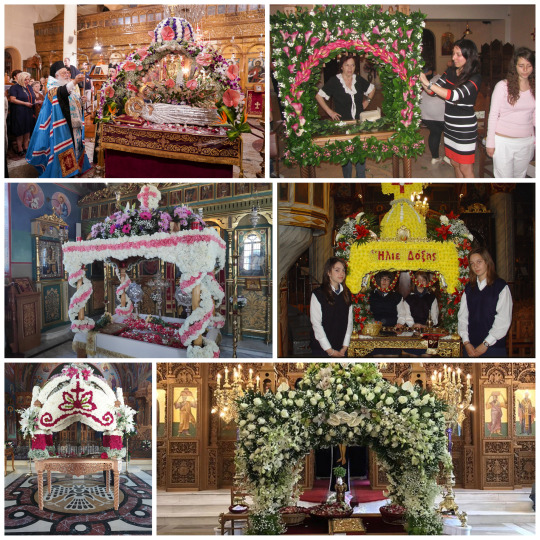
Throughout the day, people can come into the church and venerate it. Kids have to pass under the platform in order to take a blessing.
In the evening the service begins; near the end of the ceremony, the canopied platform bearing the icon is lifted on the shoulders of priests or churchgoers (usually four to six people) and carried through the streets followed by the believers.

In towns with more than one parish, the processions starting from different churches may converge to a single spot (usually the town square), where they temporarily stop and a common hymn is sung before they resume their routes. In large towns, the chants are often performed by a marching band.
The epitaphs in the Central Square of Larissa (Short Video)
These practices have numerous variations according to regional traditions. On the island of Zakynthos in the Ionian, instead of an embroidered cloth, a lamb is used: this is a figure of the dead body of Christ, cut out from board and painted from both sides, placed vertically so that it can be seen from either side of the bier. Another famous custom, the “burning of Judas”, where an effigy of Judas is set aflame on a bonfire, is usually regarded as an Easter Sunday ritual; in some parts of Thrace and Macedonia, however, it takes place on Good Friday, after the procession. In some coastal towns, most notably on the islands of Hydra and Tinos, the men carrying the Epitaphios march right into the sea, until they are at least waist-deep in water, where they may remain for several minutes, often holding the platform high to protect it. During this time, prayers are said for the welfare and safe return of the many seafarers coming from those communities.
Watch footage from the Epitaphios procession in Kaminia, Hydra (Short Video Link)
Τhe flowers used for the adorning of the Epitaphios are considered blessed and women used to put them under their pillow for protection or to dream their future husband, or to put them in talismen for their beloved or use them as medicine, or they put them in the home altar.
On 00:01 on Easter Sunday the priests happily chant "Christ has risen from the dead!" in one of the most known and iconic chants in Greek Orthodoxy. There are fireworks and we kiss each other on the cheek having this exchange: - Christ has risen! - True! This exchange is used by many as a greeting for 40 days after the resurrection. In the Resurrection the priest offers the Holy Light and people go to get it and pass it to their own company or anyone else who asks for it. The candle is held in candles you buy yourself but for children their god parents buy them. With the smoke of this fire you make a cross above your door and you don't clean it up - never. A door can have multiple black crosses above it. With the Holy Light you light up the lamps of your home altar. Some people have breaking eggs contests right after the announcement of the Resurrection, others do them when they come home. We also eat a special soup that night called Magiritsa. It has meat so with this we cut our feast. When the morning comes we host family gatherings and eat as much meat as we want.
19. Vasilopita on Christmas
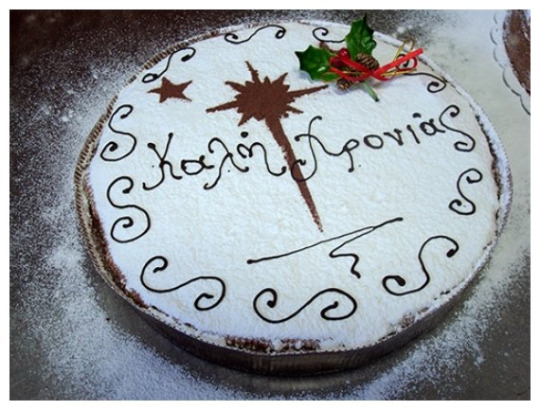
The Greek word Vasilopita is directly translated as “Sweet Bread of Basil”. When the Vasilopita is prepared, a coin is baked into the ingredients. When the observance begins, usually on New Years Day, the bread is traditionally cut by the senior member of the family, and the individual who receives the portion of the Pita which contains the coin is considered Blessed for the New Year.
Vasilopita is also cut in educational institues and the workplace. Whoever finds the coin usually receives a gift.
This age old tradition commenced in the fourth century, when Saint Basil the Great, who was a bishop, wanted to distribute money to the poor in his Diocese. He wanted to preserve their dignity, so as not to look like charity, he commissioned some women to bake sweetened bread, in which he arranged to place gold coins. Thus the families in cutting the bread to nourish themselves, were pleasantly surprised to find the coins.
20. Kalanda

Caroling (kalanda) has roots in ancient Greece. Children would carry small boats and sing songs honoring Dionysius. In Ancient Greece the children would praise the head of the household. At this time in history they would also gift the head of the household with an olive branch, which signified prosperity. Greek Christmas carols date back to the Byzantine times.
After singing for the household, the children receive money (and sometimes sweets). Before the financial crisis one could gather hundreds of euros from Kalanda.
Children say Kalanda on Christmas Eve, on New Years Eve, on Epiphany Even and Lazaros Sabbath. The songs are different for those four occasions.
21. Mount Athos
Mount Athos is a mountain and peninsula in northeastern Greece and an important centre of Eastern Orthodox monasticism. It is governed as an autonomous polity within the Hellenic Republic. Mount Athos is home to 20 monasteries. It’s commonly referred to as Agion Oros (Άγιον Όρος, 'Holy Mountain').
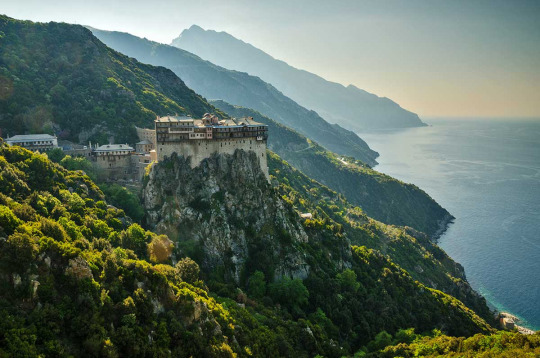
According to the Athonite tradition, the Virgin Mary was sailing accompanied by St John the Evangelist from Joppa to Cyprus to visit Lazarus. When the ship was blown off course to then-pagan Athos, it was forced to anchor near the port of Klement, close to the present monastery of Iviron. The Virgin walked ashore and, overwhelmed by the wonderful and wild natural beauty of the mountain, she blessed it and asked her Son for it to be her garden. From that moment the mountain was consecrated as the garden of the Mother of God and was out of bounds to all other women.
22. Pilgrimage to Tinos

15 August is a national holiday in Greece and sees a mass departure from the cities to the islands and holiday homes in the mainland. However one island in particular witnesses more activity than most; the island of Tinos. Across Tinos are churches and shrines, the most famous of which is Panagia Evangelistria, the most holy church in Greece which houses the ‘Miraculous Icon of Virgin Mary’. In the Greek Orthodox religion, the Icon is considered to be the protector of all of Greece.
In the Orthodox Church the 15th is ‘Virgin Mary Assumption Day’ where the Virgin is believed to have ascended to heaven. The ritual of travelling to pay homage to such a sacred Icon at this time is highly emotional for Pilgrims, with the Holy Icon in Tinos serving as a main passage between the Virgin and the believers who seek comfort and miracles on their trip.

Often pilgrims crawl to the church from the boats that they arrive on on their hands and knees to show their devotion and pray for compassion, good health and healing. The final part of the pilgrimage often happens in the blazing heat which makes the effort even more momentous.
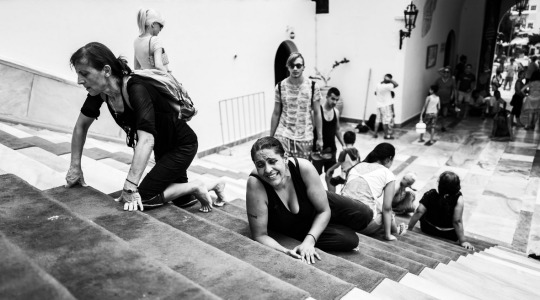
The atmosphere at and around the Church in the days proceeding the event is sincere and intense. Other pilgrims will arrive at Tinos the night before and sleep in front of the Church to ensure they have the opportunity to see and pray to the Holy Icon.
On the day itself the Holy Icon is carried through the streets of Tinos by members of the Greek army and navy, followed by the Greek Orthodox priests, political figures and the public. The procession leads down to the port when the Icon is stationed on a marble podium and speeches are made. The desire of members of the public to touch the icon often leads to a frenetic atmosphere as pilgrims try to touch the Icon itself. After the procession and speeches the Holy Icon is returned to the Church.
__________________________________________
In the same day Epitaphs of the Virgin Mary are honored and are taken to the streets so everyone can pay their respects.
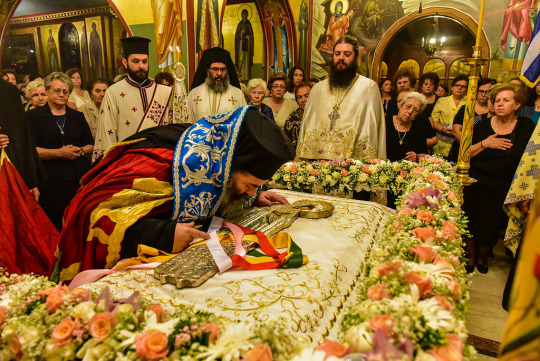
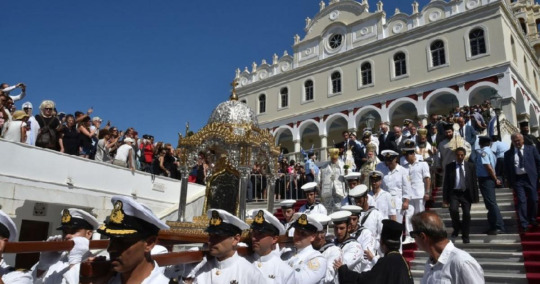
23. The Catching of the Cross
On the sixth of January, the Christmas holidays in Greece officially come to an end with the ‘festival of light’ (‘ton foton’ in Greek), also known as Epiphany.
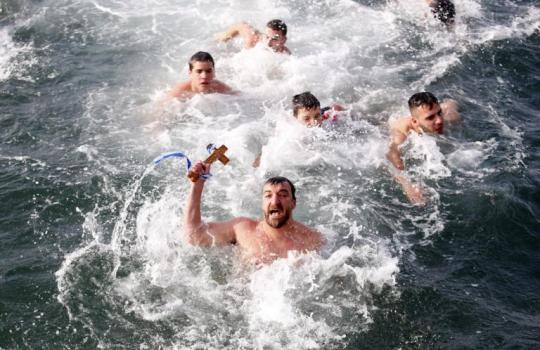
In the Greek Orthodox Church, Epiphany is celebrated as the revelation of Christ as the messiah and second person of the trinity, at his baptism, by John the Baptist, in the River Jordan.
Another cause for celebration in the Greek Orthodox Church on this day is that Christ’s baptism was only one of two occasions when all three persons of the trinity revealed themselves, at the same time, to humanity:
God the Father, speaking from the clouds, God the Son, being baptized in the River Jordan, and God the Holy Spirit, revealed as a dove, descending from heaven.
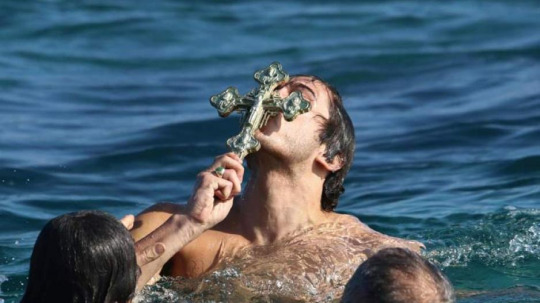
On Epiphany, the Greek Orthodox Church performs
the ‘Great Blessing of the Waters’.
This ceremony is usually performed twice, once on the eve of Epiphany which is performed in the church, and then again on the actual day outdoors with priests blessing large bodies of water, sea, rivers, lakes etc.
The tradition is that
a priest, surrounded by brave young men and boys, throws a cross into the sea, either from the harbour or from a boat at sea; the minute the cross leaves the priest’s hand, the divers jump into the freezing water to catch the cross. The lucky one who finds and returns the cross is blessed by the priest. As the cross is victoriously brought back, the priest releases a white dove, as a symbol of the holy spirit.
This tradition is carried out to commemorate the baptism of Christ and to bless the waters.
24. More customs
Each city, town and village is protected by a different saint. When the saint of the area celebrates a fair is organized. There is music, dance and stalls where the peddlers sell their merchandise.

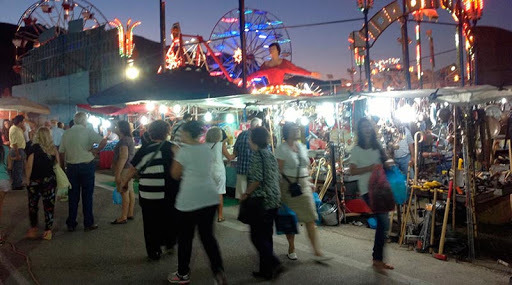
But Greeks know that some of their customs are not approved by the church. We do it anyways and sometimes the priests join, too!
Το celebrate the Epiphany and chase away the evil spirits some residents dress up in scary attire and make a lot of noise with their voice and bells. They drink excessively, they dance and even fight with each other “to the death“ (it’s fake, don’t worry!). This custom exists in many areas of Greece, from Thrace to Cyprus. Even though the people who dress up have many names - momogeroi, babougera, ragoutsia etc - they all symbolize the carefree spirit, childish fun and trickery. Don’t get in their way because they will chase you though the village!

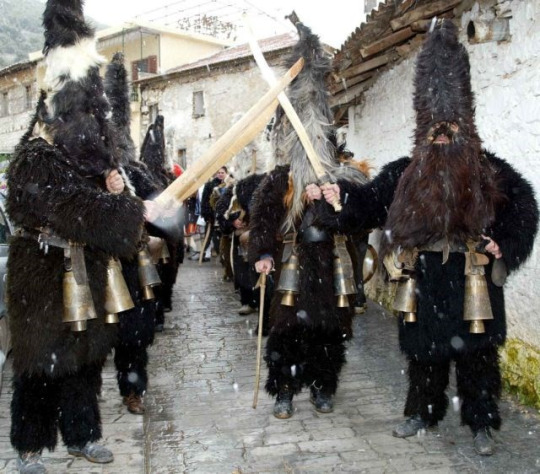
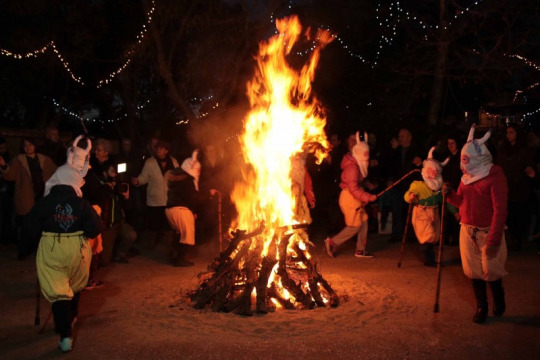
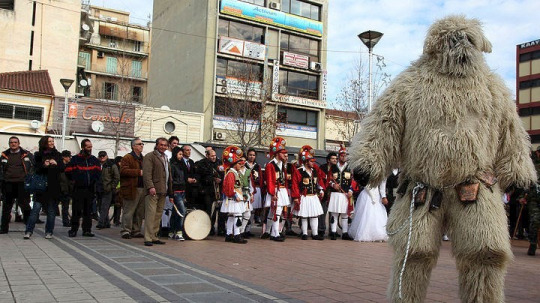
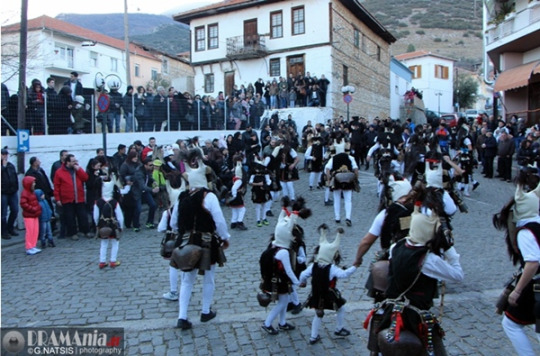

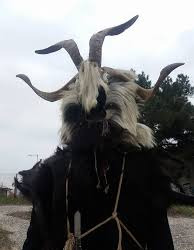
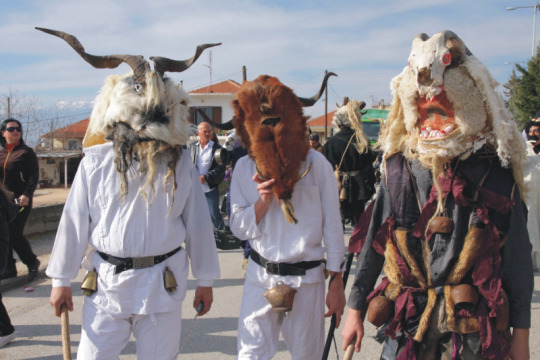

In these festivals there are different characters like the bride, the devil, the cop etc, who can symbolize fertility, the New Year, the Old Year and other concepts.
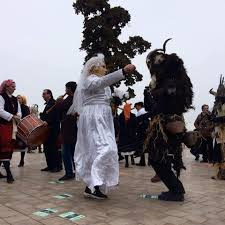

Sometimes the bride (usually played by a man) is abducted and it’s said to be a remnant of a re-enactment of the abduction of the goddess Persephone by Hades.
In other areas the Dionysiac character of the festival is eccentuated by the presence of a man who pretends ot be the god of wine, vegetation, happiness, Dionysos.

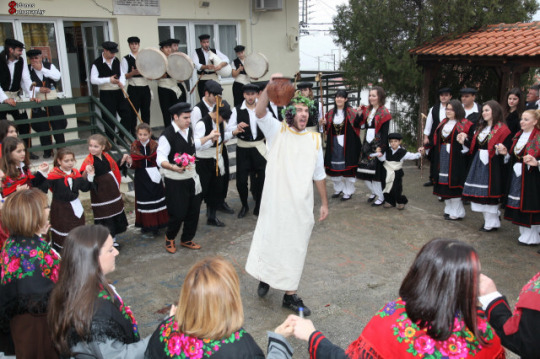
In some areas there is also dancing around a gaitanaki!
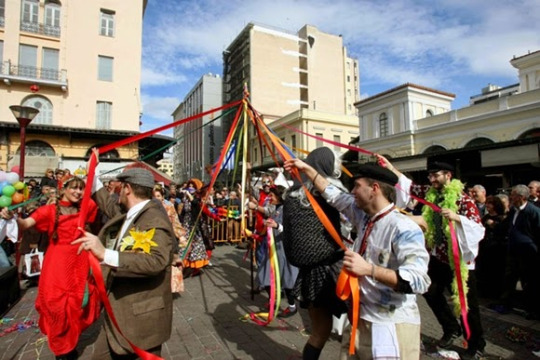
In some areas a fake camel (three people under a cloth) is presented on the streets. It probably started as a spectacle for kids but in some cases today it’s a symbol of resilience and patience. It can also remind us of the magi who rode camels to visit baby Jesus.
There is also the story where a Greek woman is abducted by a Turk and three young men pretend to be a camel to enter the Turk’s wedding with her and steal her back! (Something like the Trojan Horse!)

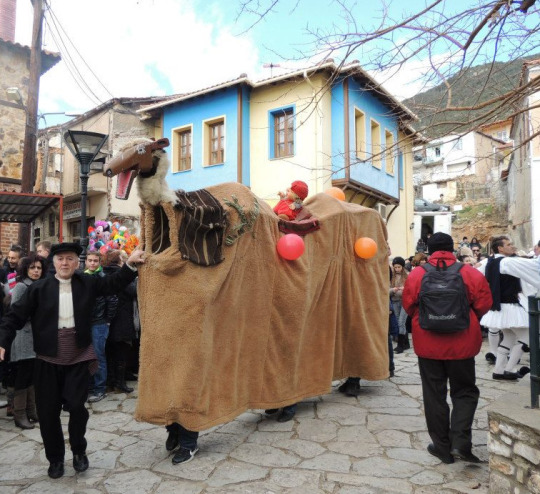
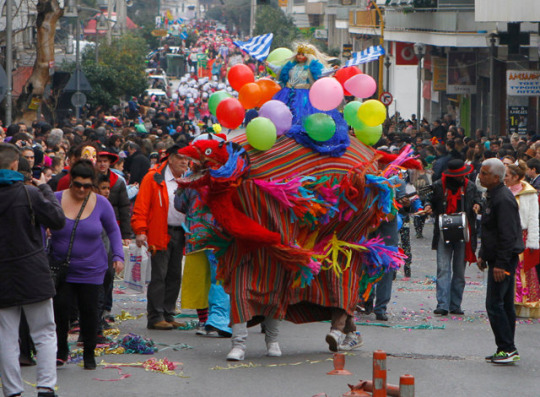
25. Random Information
Namedays are the days when the saint who has your name died. It's said that you actually take your name from them - even if it comes from your grandparents the saint is the reason you have it. In that day you bring treats to your school or work, or you treat your friends to drinks or coffee. People give you wishes ("enjoy your name" is the most common) and they call you on the phone to wish if they are away. The most common name in Greece is Maria and in Maria’s nameday everybody has to call half of their relatives and friends to wish. It’s a bit offensive if someone doesn’t remember your nameday or if they don’t call.
We bring food to the workplace in happy events - like when your child was accepted into a university.
Lots of people cross themselves when they pass outside a church. They could be passing on foot, on the bus, or even when they drive a motorcycle.
You also cross yourself when you call god for protection or when you hear something strange (accompanied with "come Christ and Virgin Mary!")
Making embroidery with the face of Jesus and/or Virgin Mary is a thing.
40 days after the pregnancy women and their newborns can woman can go out of the house but they have to go to Church to be blessed by a priest first.
We say "Christ!" when a person is chocked and "Small healths!" when someone is sneezing. When a baby is yawning bad spirits could come in so we cross their mouth. We also give them eye bendants so the Evil Eye won't get to them. People spit (just saying "ftou ftou ftou") the child after saying good words for them so they can protect them from others who will flatter them with malice. The Evil Eye is recognised by the Church. See more in my #mati tag.
Bell ringing every day before the morning and evening liturgy. It also chimes every hour. On Good Friday it rings solemnly all day.
Priests are considered spiritual leaders by many in the sense they can listen to you and guide you like a psychologist. "My spiritual" people call them.
You don't have to have your mind unguarded, that's why Greek orthodoxy is against yoga which teaches the emptying of mind
Mondays and Wednesdays of all year are for fasting - just meaning you don't eat meat. Some people also fast sexually on those days.
Hatzis- (from middle eastern "hajj") is for people visiting the holy land (Israel) on pilgrimage.
The icons of saints you buy have to be blessed by the Church before you hang them, so they can offer you a connection to the divine.
Every day at school children gather in the yard and one child says the Lord’s Prayer
We don't know the hymns by heart. They are too many and long. But there are books you can read and older people (usually women) usually study them.
All the saints in hagiographies look kinda malnourished because they are supposed to avoid the earthly pleasures.
We give epithets to the saints according to their characteristics - like we did with our ancient gods.
Lots of saints probably “covered” the dominions of older deities because Greeks were used to having smaller powerful entities for different stuff (there is even a saint who helps you find stuff if you dedicate a pie to the church)
We have a set of explanations for dreams (Ονειροκρίτης). For example, if you see something very good in your sleep about a person, misfortune will find them. If you see them dying, they will live for many years.
We read the future in the bottom of the cup of Greek coffee.
From the Byzantine era and today people buy holy wood - from the cross of Christ they say - and bones of saints. In the old time those were also used for witchcraft.If you are born on a Saturday you don't see creatures or ghosts. Also people born on Saturday are lucky and whatever they wish comes true.
Dick festivals are a thing in some areas and they mostly happen on Greek Carnival. Traditional sex songs with dances are also a thing.
Virgin Mary is the mother of Greece, and you see her as a mermaid even. We are pretty chill with our divine figures - we use them in swearing a lot, too.
Many people cross themselves before and after eating.
We take oil blessed from the Church and we put it in the lamps of our home altars. We also anoint people who want to keep safe with it. (My grandma made a cross in my forehead, for example). Many take it home the myrrh produced by the bodies of saints.
We place a bone of a saint on the ground where a church is going to be built.
Sometimes we call a priest to bless our new vehicle!
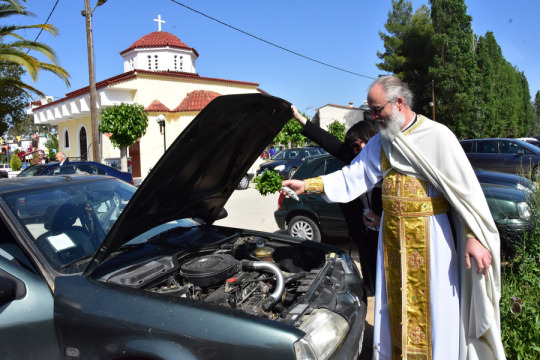

Also, it’s not a very safe practice but a lot of people hand crosses and icons from their front mirror.
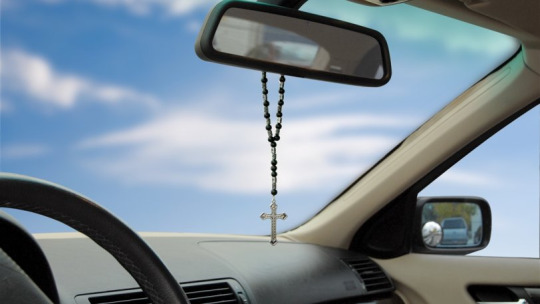

Notice that the #mati is also there!
36 notes
·
View notes
Text
HOMILY for the Feast of the Holy Name of Jesus
Acts 4:8-12; Luke 2:21

These days after Christmas are especially beautiful because the Church’s Liturgy and her solemn feasts teach us the identity of the Babe of Bethlehem, the One who was laid in the manger. The Church does not allow for any sentimentality, nor are we merely to honour a generic mother and child, nor are we to bask in any premature triumph. Rather, the birth of this Child is followed, in the Church’s Liturgy, by the shedding of blood: St Stephen the protomartyr, the Holy Innocents, and St Thomas of Canterbury all shed their blood for Christ and for his Mystical Body, the Church, and they are commemorated in the Octave of Christmas. However, the holy martyrs all died for Christ because of who he uniquely is, and what he has accomplished for Mankind.
Today’s Gospel shows us firstly what has been done for us: Christ is the One who has first shed his blood for the salvation of Mankind. For the first time, the infant Christ, just eight days old, shed his blood at his circumcision, and in doing so he inaugurated a new covenant between God and Man. Indeed, he himself is the new and eternal covenant, because in him God and Man are hypostatically united; he is the Lord God made flesh and dwelling among us!
This is the wonder of the Incarnation, which results in a “sweet and marvellous exchange” that the Church’s Liturgy contemplates in these days of Christmastide. As St Thomas Aquinas says: “The only-begotten Son of God, wanting to make us sharers in his divinity, assumed our nature, so that he, made man, might make men gods”. The martyrs, therefore, willingly and lovingly shed their blood and die for Christ because they know that, united to him through grace, they now share in the divine nature which cannot die. Moreover, St Basil the Great said: “Just as the death which is in the flesh, transmitted to us through Adam, was swallowed up by the Godhead, so was the sin taken away by the righteousness which is in Christ Jesus”.
Through the Incarnation, therefore, God has saved us from our sins and from the eternal death that humanity has deserved because of original and actual sin. Hence, at his circumcision, the Newborn Son of the Virgin is named ‘Jesus’, the name revealed by the angel Gabriel, and this name, in Hebrew, means: ‘God is salvation’, or ‘God saves’. Thus the holy name of Jesus tells us what God is doing for humanity in the person of Jesus Christ: Through Jesus, and Jesus alone, God himself is acting to save us from sin, from eternal death, and from the powers of hell. But God not only saves us, but he is, moreover humanity’s salvation because he changes our destiny. For through Jesus, and Jesus alone, God is acting to elevate our human natures, giving us Christ’s grace through the Sacraments and through a life of charity, so that we might be changed and become, no longer sinful men who think like the rest of the world, but rather men and women who think and behave like Christ. Hence St Gregory Nazianzen said: “Let us seek to be like Christ, because Christ also became like us: to become gods through him since he himself, through us, became a man. He took the worst upon himself to make us a gift of the best.”
Therefore, no matter what the world’s tyrants throw at a Christian martyr, no matter what is inflicted upon them, they willingly endure the worst and go to their death with this fundamental hope, a hope that we share because it is expressed in the Post-Communion prayer of today’s Mass: that our names are written in heaven, thanks to our faith in the saving Name of Jesus. Truly, God has made a gift of the best to us, giving us a share in his divine nature, a promise of heaven if we but trust in his holy name and call upon him. Hence the English martyrs of the Reformation period had a beautiful prayer which simply said: “Jesu, Jesu, Jesu, be to me Jesus”, meaning, be to me, salvation. For the name of Jesus is synonymous with our salvation, and the holy martyrs called upon his holy name with reverence and love, and in doing so, they confessed that Jesus is Lord, “true God from true God.” For only God can be our salvation; only God saves. So, to call upon Jesus as our salvation, to trust in the power of his holy name, is to acknowledge his divinity; it is to acknowledge his identity, and to profess belief in him as “God from God… consubstantial with the Father.”
All these lines from the Creed concerning the nature and identity of Jesus Christ, which we sing every Sunday, are densely expressed in the Church’s Liturgy at Christmastide, and particularly on this feast of the Holy Name. For St Peter declares in the reading we hear today that “there is salvation in no one else” other than Jesus Christ “for there is no other name under heaven given among men by which we must be saved.” (Acts 4:12) Therefore, when, in the Gospel, we recall that the angel reveals that the Virgin’s Son is to be called Jesus, and he sheds his blood at the circumcision, we are thus given to know that the Lord who saves all Mankind is none other than this Baby, this One whom all heaven and earth and all under the earth shall one day come to adore (cf Phil 2:10), as today's entrance chant declares. So the Second Vatican Council taught: “God's Word, by whom all things were made, was Himself made flesh so that as perfect man He might save all men and sum up all things in Himself… He it is Whom the Father raised from the dead, lifted on high and stationed at His right hand, making Him judge of the living and the dead.” (Gaudium et spes, 45)
On the back of the chasuble I am wearing today, therefore, you will see the Holy Name of Jesus, abbreviated in Greek. But in the centre of the Cross on the chasuble, there is the face of a martyr, the first martyr of the Dominican Order, called Peter of Verona. His presence is significant, not only because he points to all the martyrs who shed their blood for Christ, with faith in the saving power of Jesus. But, moreover, St Peter Martyr points to the importance of true faith in the identity and person of Jesus Christ; doctrine matters.
For, as an Inquisitor, St Peter Martyr was, like all the first Dominicans, deeply opposed to the Albigensian heresy that denied the orthodox doctrine concerning the Incarnation of Christ. Because of their wrong belief, these heretics denied the goodness of God’s created world; they denied the dignity and reverence due to the human body and advocated suicide and childlessness; they believed, erroneously, in a good God who they said created spiritual things, and an evil god that created material things.
But, as we know, there is only one God who is Creator of all things, visible and invisible. And the one God became Man for the sake of our salvation, hence there is only one name given to us under heaven by which we must be saved. So, the Second Person of the Holy Trinity, Jesus Christ, assumed our human nature and united it to himself, becoming for us Men the new and eternal covenant, a covenant that is indicated by the circumcision, and sealed by the shedding of his blood on the Cross, and ratified in the giving of his Body, Blood, Soul and Divinity in the Holy Mass.
Therefore, when St Peter Martyr was struck down by an assassin he wrote on the dusty ground with his blood: “Credo in unum Deum”, the first words of the Creed, for in doing so, he professed with his life’s blood, the true Faith, the saving Faith, the necessary belief in who Jesus is, and in what he has done for us. For, as St Gregory Nazianzen says: “What has not been assumed has not been healed”. So, by assuming our humanity, by his Incarnation as Man, Jesus Christ our true God, has healed our sinful human natures: Jesus Christ has saved us from our sins, our turbulent emotions, our lusts and desires, our illness and griefs, and our mortality. Hence the Second Vatican Council rightly declared: “The Lord is the goal of human history, the focal point of the longings of history and of civilization, the centre of the human race, the joy of every heart and the answer to all its yearnings.” (ibid.) Therefore, as St Paul says, “at the name of Jesus [let] every knee… bow, in heaven and on earth and under the earth, and [let] every tongue confess that Jesus Christ is Lord” (Phil 2:10-11). For if we do not acknowledge him now in this lifetime, we shall certainly have to do so when he returns in glory to vindicate the faith of his martyrs, and to judge the living and the dead. (cf Apoc 6:10)
13 notes
·
View notes
Photo

24th November >> Fr. Martin’s Gospel Reflections / Homilies on Luke 21:20-28 for Thursday, Thirty Fourth Week in Ordinary Time: ‘Stand erect, hold your heads high’.
Thursday, Thirty Fourth Week in Ordinary Time
Gospel (Except USA)
Luke 21:20-28
There will be signs in the sun and moon and stars.
Jesus said to his disciples, ‘When you see Jerusalem surrounded by armies, you must realise that she will soon be laid desolate. Then those in Judaea must escape to the mountains, those inside the city must leave it, and those in country districts must not take refuge in it. For this is the time of vengeance when all that scripture says must be fulfilled. Alas for those with child, or with babies at the breast, when those days come!
‘For great misery will descend on the land and wrath on this people. They will fall by the edge of the sword and be led captive to every pagan country; and Jerusalem will be trampled down by the pagans until the age of the pagans is completely over.
‘There will be signs in the sun and moon and stars; on earth nations in agony, bewildered by the clamour of the ocean and its waves; men dying of fear as they await what menaces the world, for the powers of heaven will be shaken. And then they will see the Son of Man coming in a cloud with power and great glory. When these things begin to take place, stand erect, hold your heads high, because your liberation is near at hand.’
Gospel (USA)
Luke 21:20-28
Jerusalem will be trampled underfoot by the Gentiles until the times of the Gentiles are fulfilled.
Jesus said to his disciples: “When you see Jerusalem surrounded by armies, know that its desolation is at hand. Then those in Judea must flee to the mountains. Let those within the city escape from it, and let those in the countryside not enter the city, for these days are the time of punishment when all the Scriptures are fulfilled. Woe to pregnant women and nursing mothers in those days, for a terrible calamity will come upon the earth and a wrathful judgment upon this people. They will fall by the edge of the sword and be taken as captives to all the Gentiles; and Jerusalem will be trampled underfoot by the Gentiles until the times of the Gentiles are fulfilled.
“There will be signs in the sun, the moon, and the stars, and on earth nations will be in dismay, perplexed by the roaring of the sea and the waves. People will die of fright in anticipation of what is coming upon the world, for the powers of the heavens will be shaken. And then they will see the Son of Man coming in a cloud with power and great glory. But when these signs begin to happen, stand erect and raise your heads because your redemption is at hand.”
Reflections (10)
(i) Thursday, Thirty Fourth Week in Ordinary Time
Many of the responses we say or sing at Mass are drawn from the Scriptures, such as ‘Holy, Holy, Holy Lord…’ which comes from the prophet Isaiah. When the priest says just before distributing Holy Communion, ‘Behold the Lamb of God, behold him who takes away the sins of the world’, it is drawn from the words of John the Baptist in the gospel of John as he points out Jesus to his disciples. When the priest goes on to say, ‘Blessed are those called to the supper of the Lamb’, it is drawn from today’s first reading from the Book of Revelation, ‘Happy are those who are invited to the wedding feast of the Lamb’. The writer there was referring to the great feast in the kingdom of heaven, when the risen Lord, the Lamb of God, would gather people of every race and language who were open to his invitation. When the priest speaks of the ‘supper of the Lamb’, he is referring to the Eucharist at which we are gathered. The table of the Lord, the altar, from which we are fed by the Bread of Life looks ahead to that final banquet of eternal life to which we are all called. This is the hope that our faith gives us. We never lose that hope even when a great darkness comes over our world, our cities, our lives. Jesus refers to such great darkness in today’s gospel reading, but he goes on to say that he will come into this darkness with great power and glory, and, therefore, we should always stand erect, with our heads held high, full of hope. The Lord is always present at the heart of any darkness in which we find ourselves, and he is always at work to bring us to our final destiny, the banquet of eternal life.
And/Or
(ii) Thursday, Thirty Fourth Week in Ordinary Time
This morning’s gospel has a very dark tone to it. Jesus speaks of the destruction of Jerusalem and the terrible consequences for all who are living there. He goes on to speak of great disturbances in the cosmos that will bring fear to people everywhere. Yet, just when all is at its darkest, Jesus declares that the Son of Man will appear in all his power and glory bringing redemption, liberation, to all who welcome his coming. There are times in our lives when our own world can appear to be falling apart. Disturbing events happen over which we have little or no control; we can be left shaken and frightened. This morning’s gospel reading is reminding us that it is above all in such moments when we are most aware of our vulnerability and frailty that the Lord is closest to us. He stands by us in his risen power, giving us strength in our weakness. His presence has the power to liberate us from our fears and to give us the confidence to stand erect with our heads held high, in the words of the gospel reading. We can be tempted to let the darkness envelope us. We need to resist that temptation because the light of the Lord’s presence shines in the darkness and we are assured that the darkness will not overcome it.
And/Or
(iii) Thursday, Thirty Fourth Week in Ordinary Time
This morning’s gospel reading is full of the darker side of human experience. It makes reference to wars, to destruction, to great upheavals and to the fear they generate. Yet, the gospel reading also speaks about the coming of the Son of Man into the midst of all this darkness and it promises that those who are open to his coming will experience liberation. We all need to be liberated in one sense or another; we all need to be freed from whatever it is that is holding us back from doing what the Lord is calling us to do, from being the person the Lord is calling us to be. It is only the Lord who can free us to live as we are meant to live. Saint Paul speaks about the glorious freedom of the children of God that awaits us beyond this life. Yet, here and now, we can begin to taste the first fruits of that glorious freedom, to the extent that we open our lives to the coming of the Lord and to the coming of his Spirit. Saint Paul also says in another of his letters, ‘where the Spirit of the Lord is, there is freedom’. We are only truly free when we are living in tune with the Spirit of the Lord, when the Holy Spirit is bearing rich fruit in our lives. As we come to the end of the church’s liturgical year and as we begin a new liturgical year, we pray, ‘Come Holy Spirit’.
And/Or
(iv) Thursday, Thirty Fourth Week in Ordinary Time
The gospel reading this morning paints a rather grim picture on this November morning. It speaks of the fall of the city of Jerusalem to her enemies, the destruction of its people and disturbing signs in nature. Yet, this grim time is also the moment when the Son of Man will appear in great power and glory. In the time of greatest darkness a light begins to shine. That was true of Golgotha also. This time of great darkness was also the time when the light of God’s love shone most brightly. The gospel reading assures us that there is a light at the heart of every darkness. In our own dark experiences the light of the Lord’s presence never ceases to shine. That is why, when the darkest times come our way, in the final words of the gospel reading, we can stand erect and hold our heads high. Next Sunday, in these dark days, we begin to light our Advent candle. We are being reminded that the light shines in the darkness and the darkness will not overcome it.
And/Or
(v) Thursday, Thirty Fourth Week in Ordinary Time
In the beginning of the chapter of Luke’s gospel from which we are reading this week Jesus spoke about the destruction of the Temple in Jerusalem. In this morning’s gospel reading he goes further and speaks about the destruction of the city of Jerusalem itself and of the land of Israel. ‘Great misery will descend on the land’, he declares, ‘and Jerusalem will be trampled down by the pagans’. All of that happened forty years after the death and resurrection of Jesus when the Romans destroyed the city of Jerusalem with its Temple in response to the Jewish revolt against Rome which had begun four years earlier. Yet Jesus assures his disciples that this awful prospect is not the complete picture. He goes on to speak about the coming of the Son of Man with power and great glory bringing liberation to those who are in need of it. For that reason even in the midst of the chaos and loss the disciples can stand erect and hold their head high. Even though there may not be much ground for optimism, we are called to be hopeful because the Lord is coming, not just at the end of time but here and now in the midst of time. We can let our heads drop when so much seems uncertain and the future seems bleak, but the realization of the Lord’s constant coming into our lives, into our church, into our world, inspires us to stand erect and hold our head high in hope and expectation.
And/Or
(vi) Thursday, Thirty Fourth Week in Ordinary Time
The gospel readings at this time of the year tend to be rather gloomy, at least on first hearing them. We are in the last days of the church’s liturgical year; the new liturgical year begins on Sunday, the first Sunday of Advent. As the church’s year end, we hear of cataclysmic endings in the gospel reading, the ending of Jerusalem, and, even, the ending of the cosmos as we know it. Yet, as well as talking about endings in our gospel reading, Jesus also speaks about comings. More especially, he speaks about his own coming as the glorious Son of Man, bringing liberation to those who await his coming. At the very moment when everything appears to be disappearing, a new reality begins to dawn. The final chapter will not be one of death and destruction but one of new beginning and a new liberation for all. This is but one expression of the basic message of the gospels, that the Lord works in life-giving ways in the midst of death and destruction. There may be great darkness in the world, the darkness of evil and suffering, but the Lord’s light shines within it and the darkness will not overcome the light. It is this conviction which keeps us hopeful even in the midst of pain, loss and death. That is why in the words of the gospel reading, we can always stand erect and hold our heads high, not in a spirit of arrogance but in a spirit of hopeful conviction that the Lord’s liberating coming is assured, no matter how dark and distressing the moment.
And/Or
(vii) Thursday, Thirty Fourth Week in Ordinary Time
Today we have another of those rather dark gospel readings that are typical of the concluding days of the liturgical year. Jesus depicts the disturbing scenario of the destruction of the city of Jerusalem with traumatic consequences for its inhabitants. We can think of cities that are being destroyed today, cities in parts of the Middle East. We are very aware of the suffering of their inhabitants at this time. We can be tempted to ask, ‘Is there life beyond all this destruction?’ In the gospel reading, the answer of Jesus to this question is a resounding ‘yes’. He speaks of the coming of the Son of Man in the midst of so much destruction and upheaval. He will come with power and great glory announcing that liberation is at hand. Death and destruction does not have the last word in the Lord’s purpose. He enters into the heart of every darkness with great power, always with a view to our ultimate liberation from all that diminishes and damages us. He has come that we may have life and have it to the full. He sheds tears when we chose paths that bring destruction and death to those he loves. He is passionately committed to our present and ultimate well-being. He is constantly coming to bring this to pass, to bring to earth the kingdom of heaven. If this is to happen, he needs us all to welcome his coming into our own lives and to allow him to work through us in all his liberating power.
And/Or
(viii) Thursday, Thirty Fourth Week in Ordinary Time
Both of today’s readings speak of the fall of great cities. Jesus prophecies the fall of Jerusalem to the Roman armies with the terrible suffering that will bring for its inhabitants, ‘Jerusalem will be trampled down by the pagans’. The first reading from the Book of the Apocalypse speaks of, indeed celebrates, the fall of Babylon, ‘Babylon the Great has fallen’. Babylon is code for Rome. At the beginning of the sixth century before Christ, the Babylonian Empire had destroyed the city and temple in Jerusalem, resulting in the Babylonian Exile for the Jewish people. By the time the Book of the Apocalypse had been written just towards the end of the first century A.D., Jerusalem and its Temple had been destroyed again twenty five years earlier by the empire of Rome, the new Babylon. The churches for whom this book was written had also experienced the destructive power of Rome. The reading speaks about God’s servants that Rome has killed. Is there any light in all this darkness, any hope in all this destruction? It is a question that could be asked in many a war-torn situation today. Both readings, however, end on a note of hope. In the gospel reading Jesus assures his disciples that all this destruction is the prelude to his coming as Son of Man with power and glory. His power and glory are not the power and glory associated with worldly empires like Babylon and Rome. Far from being destructive, the Lord’s power is life-giving and liberating from evil, ‘your liberation is near at hand’. Even in the darkest of situations, the Lord’s coming with the liberating power of his love is always assured. His coming will be experienced by those who, in the words of the gospel reading, stand erect, holding their heads high. This is not an arrogant posture. Rather, it is a posture of trust in the Lord whose light and love no darkness or hatred can overcome, and who holds out to his faithful ways an invitation to his great wedding feast, in the words of the first reading.
And/Or
(ix) Thursday, Thirty Fourth Week in Ordinary Time
Jesus paints a very distressing picture of the future in today’s gospel reading. He looks ahead to the destruction of Jerusalem by the Romans, resulting in its inhabitants being killed or taken into captivity. In those dark days for the holy city, nature itself will seem to share the anguish of the city and its inhabitants, with disconcerting signs in the sun and the moon and the stars. Jesus seems to be using a very dark pallet to paint this scene. Yet, a light emerges against the dark backdrop. Jesus declares that at that very moment when people are dying of fear, the Son of Man will come with great power and glory. His power is not a destructive power, like the power of Rome, but a liberating power, a power that frees people from all that threatens to destroy them, ‘stand erect, hold your heads high, because your liberation is near at hand’. Jesus does not play down the dark, destructive forces that threaten God’s people, but he insists that these dark forces will not ultimately win out. There is a greater force at work among us, God’s force or power, present through his risen Son, the force of a love that liberates and makes whole. We are all called to be channels of that liberating force of God. We can allow ourselves to be paralyzed by the dark forces that stalk the land, or we can hold our heads high in confident hope, in the assurance that the Lord of all is in our midst and trusting, in the words of Saint Paul, that his power working among us can do immeasurably more than all we can ask or imagine.
And/Or
(x) Thursday, Thirty Fourth Week in Ordinary Time
In today’s gospel reading, there is a clear reference to the destruction of the city of Jerusalem, which happened forty years after the death and resurrection of Jesus. Jerusalem fell to the armies of Rome, under the general Titus, who went on to become Emperor of Rome. In the time of Jesus and the early church, the all-powerful Roman Empire must have been seen as eternal, as destined to last forever. Yet, in the first reading, written towards the end of the first century, the author declares, ‘Babylon the Great has fallen’, ‘Babylon’ being a code name for ‘Rome’. The author recognizes that even the great, invincible, Roman Empire would not last forever, and declares that it is God and his Son who will last forever, ‘Victory and glory and power to our God’. In the gospel reading, Jesus speaks of himself as the Son of Man who will come ‘with power and great glory’. Nothing lasts forever, not even the great and powerful empires of the world. Only God and his Son endure; they are the beginning and the end, yesterday, today and tomorrow. God’s relationship with us endures; Jesus’ love for us lasts forever and every day he says to us what is said at the end of today’s first reading, ‘Happy are those who are invited to the wedding feast of the Lamb’. The Lord calls us to his feast, in the future kingdom of heaven, but also in the here and now of the Eucharist. You will recognize that beatitude from the text of the Mass. The Lord’s call to us to be in communion with him is the constant in the midst of all that is changing. That awareness can inspire us to always ‘stand erect’, holding our heads high, in the words of the gospel reading.
Fr. Martin Hogan.
7 notes
·
View notes
Text
Statement of Radioactivepeasant, regarding The Magnus Archives episodes 19-24
(Under a cut, as always)
Episode 19, thoughts:
Why does Jon feel the need to change his voice when he reads the statements?
Oh. Cannibalism. Ew.
Eh. Supernatural stuff, yeah that kind of goes hand in hand with church and all, but this guy's ascribing more power to the devil than I'd say was wise. Or, as I was told as a kid, "don't go looking for a demon behind every cat in a tree" lol.
Oh. Yeah this is basically the plot of at least four separate horror films, isn't it?
Yeah I can guess where this going.
Ok ghosts and eldritch gooblies seem to be a thing in this world, but are demons an active thing in TMA? Or is this another eldritch goobly?
Oh hey, are aliens a thing here? Or, I dunno maybe extra dimensional things.
Yeah, bud, this probably ain't a demon. Doubt it's spiritual. The whole "mentis" thing sounds like it's some kind of brain-based thing. A parasite, maybe?
Bro why steal communion wine? Stuff's gross. (Ok ok, I'll be fair: I'm one of those people who genetically can't taste anything but the alchohol itself, so all of those things taste the same to me)
Heyyy! It's the guy who uprooted the bleeding tree! These are connected! Whatever the entity in that house with the fire and the disappearing people was, it probably tried to climb into this guy's brain.
Hm. Maybe the Mentis oobly-goobly that was messing with Bethany didn't want to share this guy with the crackly-burny goobly.
Oh, gross! Considering Bethany almost ate a dang rock without knowing it, I'm guessing the brain goobly is gonna trick this poor sap into thinking he's eating something else.
Oh, a two-parter.
Episode 20, thoughts:
Here we go, back into the fray.
Good thing I'm not eating right now.
Yeah, sounds like more of a physical goobly. But dude, you can pray silently? It still works the same? The parasite thing can't stop you from talking if you never open your mouth.
Hey, was that a Not- dude in the confessional? Like the doppelganger fella from the episode with the neighbor lady and the sneaky peeky spying?
Uh oh. Eyes again.
Yeah, wherever he is, I don't think it's the church. More or less, he's under a glamour. We've taken another detour into the Twilight Zone, evidently.
The bells remind me of Edgar Allan Poe.
An appropriate text to pick...but at the same time, it didn't go far enough into the passage.
And we're back to the plots of 3 or 4 separate horror movies. Gross.
Calm down there, edgelord. Yeah yeah, we get it, you're some kind of sadistic entity and you like perverting things and playing with blasphemy but now you're in kind of silly grimdark territory. Baby's First Possession.
Nice touch with the bell though.
Ohh, someone else was involved then? So maybe the oobly-goobly thing has a physical form as well. Or is was somebody else suffering the same hallucinations.
Weird delivery service? Evil Packaging Company returns?
Episode 21, thoughts:
Oh, this one looks like it's going to be a bit short.
Again, Jon, why do you do separate voices for the statement givers? Are you bored? Because I probably would do the same thing, just to break the monotony.
Uh oh. Guy with thrill issues? This won't end well. Not for him, anyway.
Skydiving, huh? Eesh, no thanks, not for me. Not my idea of fun. Give me a nice pool or lagoon and I'll be just peachy.
Hey, remember the guy with the Leitner book who was freaking out because of the picture of the sky giving him vertigo? This sounds a lot like that.
Very Twilight Zone, this one.
I feel like this Simon guy caused this.
I'm sorry, What?
The sky ate him?!
Did it turn into quicksand?
I'm sorry. This is probably going to be significant later on, but...the phrasing is just really funny to me. The sky turned into Charlie Brown's kite-eating tree!
Hold it, What?! What just happened?!!!
Noooo I have to go to work right now, you can't leave it there!
Martin what did you find?!
Aaaahhh!
Episode 21, addendum:
Had to listen to this one again
What the flying blue heck is happening at the end?
Episode 22, thoughts:
Martiiiiin! We hear him at last!
Jon, how the heck are you still skeptical.
Martin sounds nice.
Aw.
I have decided that I am justified in liking Martin.
Martin. Martin honey I think that's breaking and entering.
Ohhh. The worms are literally silver then? I kept imagining them as white with a vague shine.
Fair reaction, Martin. But possibly not the wisest.
Hey didn't Spiders Georg say the whole building was infested by the worms?
Martin and Jon are like the two guys in a horror movie debating the existence of the monster.
Oh good, the cat survived haha
Martin noooo I can't believe I'm saying "don't go into the basement" to a podcast!
Martin. You are clearly genre-savvy. And Yet. Here you are.
Uh oh. That description is familiar. Remember Squirm? With Jane Prentiss? Betcha that's her.
Eww, grossss Corpse Bride to the nth degree!
I hope nobody's eating noodles right now.
Uh oh...Martiiiin? You should invest in a can of Raid.
Well, that's some more information on Jane, at least.
Glad Jon is taking this seriously. He's kind of being nice to Martin, which surprises me after the way he's previously talked about him.
Sounds like we've hit the tip of the iceberg at last. I think it's beginning to link up now, and undoubtedly isn't going to end well.
Episode 23, thoughts:
A discovered tomb in the Black Forest? Oh we are like two sentences in and I already know this is going to go badly for the statement-giver.
Jonah Magnus? Is he the guy who started the Institute? Imagine being the person who has to start an X-Files type organization. Like they'd have to be a living representation of that John Mulaney "this might as well happen" meme.
Actually, Jonah Magnus seems like he makes poor life choices. In this genre, someone who goes around collecting stories of the Weird and Uncanny is about 50% likely to end up either a Van Helsing style hunter dogged by tragedy, or Part Of The Problem.
The set-up reminds me of a Susan Hill novella, like The Woman in Black, or The Mist on the Mirror.
This one is perfectly suited to a graphic novel.
On the one hand, exploring places is definitely a temptation. On the other hand, that is somebody's grave, don't be rude!
Oh hey, remember the episode with the Lukas family? And the mysteriously appearing graveyard? Hopefully not connected.
The Quaker Oatmeal Man?
Ok, but "you have nothing to fear from the dead" implies there's something besides the dead in there that you should fear.
Martin! Hi Martin!
Hahaha no pants! Poor Jon.
Yeah, sure, let's go down the creepy staircase in the tomb. What could possibly go wrong.
Stone coffin? Don't mess with it, dude. Be like the guy in episode 2. Just say no!
PSA to Archives Personnel lol: "See a Coffin, Tunnel, or Spider? Just Say No!"
Oh no. Eyes. The eyes are back.
This thing sounds like a Leitner tome.
Wh- Don't rob tombs, dude!
Tobias is a familiar name. Why is this a familiar name?
I really like this episode. I'd love to see it illustrated by Mike Mignola.
Ooooo boy somebody followed youuuu
No eyes? Were those his eyes down in the tomb?
Heyyy! Gerry Keay's genealogy? Well that might explain his obsession with eyes, for sure.
I still love the entire concept of Mary Keay. 80-something old lady, shaved head, tattooed all to kingdom come, blasting death metal at 2 AM. I love that.
Episode 24, thoughts:
Clowns?
Oh dear, there's a small window of "funny clowns" in the sea of "How About No", and those folks are all like, professionals. It's the other clowns that I find a bit creepy.
Joker doesn't count. I haven't seen him do actual clown stuff in ages.
Granted, some dolls are Very Cursed, but it usually seems to be an Uncanny Valley thing. Or, in the case of one unfortunate little creature I once made, using the wrong sort of buttons for the eyes.
Ah, carnival grandpa. That's where the clowns must come in.
Nikolai...there's another familiar name.
Hm. Secretive locked attic/loft. Oh that's not ominous at all, is it?
I bet the calliope is going to start playing on its own.
Trunk full of old dolls? Irl I'd be fascinated and want to fix them up. In a universe like this though? Um. No.
The missing jaws are doubtless important. To keep them from talking?
Hey, Sasha! Is this the first time we've heard her voice? She sounds so cheerful!
Lol "Americans" yeah yeah our version of the language is a mash of a lot of things. We Frankenstein our language so much we have mandatory classes for our kids to decipher how it works. Language is funky.
Oop. Here we go, spooky circus music.
Oh, we can actually Hear the spooky circus music, very faintly. Nice touch, rather unsettling.
Did the music summon the clown doll?
A bit Doctor Who sounding, this one.
Maybe it's like the Weeping Angels, where the dolls can't come out if they're being watched?
Carrying boxes up a ladder...I hate doing that. Always worried that I'll drop something.
Josh got turned into a doll? Or something? Oh man I'm getting such Doctor Who vibes.
Somebody disassembled and stole a whole dang calliope? That's dedication. Maybe they wanted somewhere to let the dolls loose freely.
Did the clown doll do that to Josh by proxy with the Josh doll?
That clown really did not like Josh, did it?
The Circus of the Other? That sounds sinister.
Oh heck! Somehow the Archive got the calliope! Probably good that it's locked though. No need to summon Slappy again.
#tma liveblog#tma#the Magnus Archives#the magnus institute#the archivist#jon sims#martin blackwood#jane prentiss#gerard keay#the Anglerfish the Piper and Schwartzwald are my favorites so far#i probably didn't spell that right
24 notes
·
View notes
Text
1. Have you ever fought (physically or verbally) with a member of the law enforcement?: Nope.
2. If you were a video game character, who would you be?: My character on Animal Crossing: New Horizons. I’d have my own island and a cute house by the beach.
3. Have you ever peed in a swimming pool (by accident or on purpose)?: It may have happened as a child.
4. What's your greatest fear, and how do you deal with it?: Losing my loved ones is one of them. I just have to try and push those thoughts aside, but they like to creep up on me at random times. :/ It’s a fear I can’t even do anything about, like I can’t prevent it. Ugh, I’m done with this question.
5. What's the weirdest noise you've ever heard?: Uhh. I don’t know.
6. Have you ever really gone out of your way to embarrass an ex?: No.
7. Have you ever found a lost animal? What did you do with it?: A stray dog ended up in our backyard somehow before and we ended up taking care of him and finding him a good home.
8. Who's the last person you physically fought with?: I’ve never physically fought with anyone.
9. When I say "sexiest man alive", who do you think of?: Alexander Skarsgard, of course.
10. Who would you consider a very sexy woman?: I think Gal Gadot is really pretty.
11. What job would be your worst nightmare to have?: I couldn’t do anything in the medical field.
12. Have you ever seen something that you cannot explain logically (ex. something paranormal)?: No, not in that sense.
13. What's your favorite kind of potato chip?: I haven’t had any chips in years, but as far as potato chips go my favorite was the Flamin’ Hot Lays. I liked all spicy chips back when I could eat spicy foods. I miss those days. :(
14. Would you ever eat raw honey from a honeycomb?: No.
15. Do you go barefoot (no socks) in your house?: No, I like to keep socks on all the time. I’ve always been that way.
16. Do you still look at comics in the morning paper?: Nope. I did that as a kid, though.
17. If you could rule the world for a day, what's one thing you would do?: I absolutely would not want that position or responsibility.
18. What's the most important part of a pizza to you-- the crust, the toppings, or the sauce?: All of it matters to me and is what makes it good.
19. How much sugar do you put in your coffee or tea?: If I’m just using half and half with my coffee, then I add like 4-5 sugar packets depending on the coffee. If I use a flavored creamer that’s already sweetened then I don’t add any more. With tea, I just use 1-2 packets.
20. What unusual food combinations do you enjoy (ex. celery and cream cheese)?: Scrambled eggs and ranch.
21. Would you ever go shopping in a Halloween costume?: I have. My friends and I a few years ago went to a couple stores in costume on Halloween.
22. Would you ever tell a lie to protect someone from the truth?: I have done that.
23. What's your favorite kind of nut to eat?: I like peanuts, pistachios, and cashews.
24. What do you do when you go to eat something and it's too hot?: Do that weird thing a lot of people do when you’re like chewing with your mouth open really quickly lol. You know what I’m talking about.
25. Would you ever knowingly eat dog or cat meat?: Absolutely not.
26. What's your least favorite chore?: I don’t enjoy doing chore, it’s just stuff you gotta do.
27. What was the last thing you ate that contained meat?: I had Wingstop for dinner.
28. Have you ever tried soy milk? Did you like it?: Yeah. I only use soy or almond milk since I’m lactose intolerant. I don’t drink it by itself, though, I just use it in coffee, cereal, for cookie dipping, etc.
29. Have you ever worn something you didn't like, but wore it because your partner/crush/whoever liked it?: I don’t think so.
30. Have you ever made your communion? What about confirmation?: I’m not Catholic.
31. What's one of the weirdest fears you have?: Holes/clusters. Just the words themselves klsjfklsjfdlksfj
32. Do you know how to skip a stone across the water?: I’ve never tried.
33. Do you have a favorite baby picture of yourself? What is it?: Haha, I actually do. My baby photos are like the only photos I like of myself. Well, I’d say up until I’m like... 6.
34. Which do you like better with your dinner, rice or mashed potatoes?: Mashed potatoes. I don’t like white rice.
35. Potatoes: mashed, baked, roasted, or boiled. What's your favorite?: Mashed or baked out of those.
36. If you ride a bicycle, do you ever wear your helmet?: I don’t ride a bicycle.
37. If you had to lick the ground to meet your favorite band, would you?: Noooo.
38. Does anyone in your house have a piercing other than their ears?: Nope.
39. What's your favorite kind of flooring (hard wood, carpet, tiles, etc.)?: I love hardwood and tile.
40. Do you prefer flip-flops or sandals?: Neither. I don’t wear any kind of open-toed shoes.
41. Have you ever watched a celebrity's sex tape? How was it?: No.
42. Think of a random town in your state/province. What comes to mind first?: San Francisco.
43. If you could be the opposite gender for a day, would you?: Nah.
44. What time of day do you hate the most?: I like when I finally get up and have my first cup of coffee, but the time after that until my nighttime routine is kinda meh.
45. Have you ever protested for or against something? What and where?: No.
46. Ever had a crush on a teacher?: Nope.
47. What's your favorite dinosaur?: I don't have one.
48. What was your first word?: I don’t know.
49. Ever had pumpkin pie flavored ice cream? What do you think of it?: No, and I don’t have any interest in trying that since I don’t like pumpkin pie. Or pumpkin flavored anything.
50. Do you walk fast, slow, or medium paced?: I’m told I’m fast, but I’m in a wheelchair, so I think I just cover more space faster. It’s kinda like taking big steps.
2 notes
·
View notes
Text
I WILL DO A NEW THING IN YOUR LIFE EACH SECOND THAT TICKS
(A one-on-one online bible studies excerpt)
"For I, the Lord your God, will hold your right hand, Saying to you, *‘Fear not, I will help you.’*
14 “Fear not, you worm Jacob, You men of Israel! I will help you,” says the Lord And your Redeemer, the Holy One of Israel. 15 “Behold, I will make you into a new threshing sledge with sharp teeth; You shall thresh the mountains and beat them small, And make the hills like chaff. 16 You shall winnow them, the wind shall carry them away, And the whirlwind shall scatter them; You shall rejoice in the Lord, And glory in the Holy One of Israel.
17 “The poor and needy seek water, but there is none, Their tongues fail for thirst. I, the Lord, will hear them; I, the God of Israel, will not forsake them. 18 I will open rivers in desolate heights, And fountains in the midst of the valleys; I will make the wilderness a pool of water, And the dry land springs of water. 19 I will plant in the wilderness the cedar and the acacia tree, The myrtle and the oil tree; I will set in the desert the cypress tree and the pine And the box tree together, 20 That they may see and know, And consider and understand together, That the hand of the Lord has done this, And the Holy One of Israel has created it." (Isaiah 41:13-20 NKJV)
Did you see verse-13 *saying/speaking* about fear not ?
Yes, "For I the Lord your God hold your right hand; I am the Lord, Who says to you, *Fear not; I will help you*
Do you see that word speaking to you/I ? for all these moments you/I seem to be seeking to have deeper intimacy with HIM, He has been holding our right hand ? and we thought that we were not making any progress ?
Exactly. And is really pricking my heart. Sometimes, I would think of quitting.
But I was *not feeling it*. Not seeing the impact. Have been asking for help from above no matter how small. My faith seems to be failing me. Some of this Bible passages, I don't think they are referring to us in this present age. I should be able to feel it, in-fact, to be fully confident that God is holding my right hand and he's helping me too. Do you understand me now ?
My dear, everything written in the holy bible has a prophetic aspect and literal aspect, and it is the word of God which is still active in each human life no matter the age or condition or geography or circumstances, This is the area you will need to open your heart to accept and grow in it.
Ok, How do I achieve that ?
Look at Romans 15:4 we were already brought together by the Holy Spirit to be helped to solve this problem, Can you read Romans 15:4 ? when you finish tell me, The old testament were fulfilled in Christ and we are now inside Christ.
AMP: For *whatever was thus written in former days was written for our instruction*, that *by [our steadfast and patient] endurance and the encouragement [drawn] from the Scriptures we might hold fast to and cherish hope.*
I have read through the passage
Did you see that whatever is written in the Scripture is for every human being ? but there is context for understanding the new testament and the old testament ?
Yes I will dwell much on that Isaiah 41. It struck me.
The prophecy of Isaiah from chapter 40 to 52 is the prophecy about Jesus coming to fulfil the new covenant on the Cross
Ok
So, *each second of our earthly existence those passage*, He is trying to *lead us into a newer manifestation of JESUS CHRIST CRUCIFIED in our mortal bodies*
Ok, I am following
Let us go to Isaiah 43:18-21 When you finish reading tell me
Ok, completed.
Did you see God speaking to you/I directly that we should no longer remember the former things and times we thought that He was not fully with us ?
Exactly
Did you see God telling you/me that He wants to do a new thing in our lives *now* ? That He wants to give us both the physical and spiritual confirmation of His unbroken eternal presence with us ?
Yes
Did you see the list of new things that He wants to do for you/I and through us to all those around us now ?
So did you see all the list of new things that God wants to do *in your/my life from now* ?
Yes
but before this new things come, He is saying that you/I need to forget the old things ?
Alright
You/I need to recognize that there were things He told us previously that He will do in our lives and He did them. Can you remember any of them ?
Yes
let us look at Isaiah 42:8-9 please if you finish reading tell me
KJV: "I am the Lord: that is my name: and my glory will I not give to another, neither my praise to graven images. KJV: Behold, the former things are come to pass, and new things do I declare: before they spring forth I tell you of them"
I have read through it
Did you see that He is God who does not share His glory with anybody or image or spirit or being ? And Before He does anything, He tells you/I about it *because He has chosen 'out of HIS OWN FREE-WILL TO MAKE US' co-laborers with HIM in HIS OWN VINEYARD* not because *it is our right*
Yes
And those things that He said about you in the past has manifested. Before you/I can walk into the new things that He is about to do in our lives, we need to recognize that He said some things to us in the past and brought them to manifestation. You/I need to trust in His Grace and Mercy to speak something about our past, present and future *into our hearts directly and supervise them into manifestation*. Jeremiah 1:12 "I watch over my word to fulfill them". If you/I do not recognize that He has said those things in the past that has manifested them into our lives so far, you/I might have the tendency to think/assume that : 1. You/I are not coming from any useful or important position in the eyes of God 2. You/I might presume that it is our strength/determination/efforts/self-righteousness/religious-participation-spirituality that has sustained us *till now* This might lead you/I to be ungrateful about God's mercy and grace working in our lives and helping us to grow/breathe even till now
Hmmmmmmmm, It's well. Not all.
Let us look at the ones that He said and has done as well as *the ones that you think He said and He has not done together*......
Do you/I know that it is God's spoken word that planted you in your mothers womb after so many trials by your parents to have you as a child ?
Did you/I know that God was so careful not to allow the semen that fertilized us in our mothers womb not to fall-away or slip away after being deposited inside our mothers body or the tendency of our parents to give up on expecting a baby hence engaging in contraceptives or withdrawal methods ?
Did you/I know that some children were conceived in the womb at the same human time with us but they could not stay till 9-months and they were miscarried or aborted ?
Did you/I know that some of the children that came out the same day we were born, came out as dead-child ?
Did you/I know that it was not *wholly* our mothers carefulness or hygiene or medical experts specialty that brought us forth safely from our mothers womb ?
I am following
Having grown from childhood till date, how many of our age mates are still alive ?
Can you/I look back to our childhood or even past second of our lives and recall how death could have cut short our span on earth ?
You/I just walked home now from our duty-post, did you/I know that some people left their work/office/market/shop/meeting-point just to return to their house and they could not complete their journey as living beings rather as corpse in the mortuary?
hmmmmmmm,
Did you/I know that some people with the same sincere desire for God are still battling with sinful lifestyle and addictions yet they have fasted and prayed as much as their strength could carry them yet they have not connected to the grace of their complete victory over sin and an effortless communion with the HOLY SPIRIT ?
Did you/I think, it is by our power that we have been living holy life all these years ?
Hmmmmm, By strength shall no man prevail.
Did you/I know that some people read the same write-up that you read and they desire this type of connection with someone that the Holy Spirit will use to help them but they saw that post and did not comment while some just saw that post *as a motivational write-up that only requires AMEN* which they commented and left while still praying that God should help them with someone who will teach them How to connect to a deeper intimacy with God ?
Did you/I know that *salvation by grace through faith in Jesus Christ is the highest gift that God can give and has given to any human being (you/I)* ?
Yeah, With the things attached to it, makes it perfect.
Please tell me those things that God told you in the past that He did not do for you ?
Hahahaha, You said I should not remember the former things right??? That before he will do a thing I should first forget the past ?
First is for you to recognize that GOD IS GOD THERE IS NOTHING THAT HE SAID TO ANY HUMAN BEING THAT HE HAS NOT DONE rather *we have our own expectation in our minds as what we presumed* God told us that He will do for us due to some misinterpretation of scriptures; like *ask anything and you shall receive it from God*. Because *even in our sins or limitations, His grace still provides our daily needs for us* though *He hates sin* and *grace is not permission to continue in sinful living* You/I need to look at ourselves each day and *trust God* that He has never failed to show *us mercy fresh each moment despite our human limitations*
Yeah
Then we need to look at another thing about our lives that needs to be dealt with as something to forget. So, you/I are going to have the *1st prayer point/focus/word* of thanking God for keeping His word over your life and sustaining you till date. This is a sign to you/I that He wants to do a new thing in our lives. if He has finished with you in the last second, you/I would have died. So, we remember How God has been faithful.
Ok
then let us to move to another thing we need to remember, Revelation 2:1-7, if you finish reading tell me,
I have read through the passage,
Alright, Did you understand what God is saying to you/I in that passage ?
Yes, I did,
Alright, what is He telling you/I to remember there ?
Where I have fallen,
Yes, but most importantly *our first love*.
Did you/I see the list of all our efforts to please God and leave holy life ?
Yes
Why do you think those list where recognized by God yet He still found a problem with that Church ? A believer can have such engagements/activities in the household of God but he/she sees such activities as mere routine or expertise which does not have *fresh revelation because such person has become so-familiar with God and the things of God* This routine or expertise mentality *makes a believer not to be able to humble himself/herself to expect something fresh/new from the throne of God's grace in the place of daily personal consistent and progressive bible studies and fellowship with the Holy Spirit* Such a person *begins to speak more about what God achieved through his/her mortal body in the past while he/she is in the present* while the Word of God stated that *the latter glory shall be better than the former*
Hmmmmm, Error.
While *GOD is NEW every morning/moment(Lamentation 3:22)* and *He seeks for people who wants to forget about their past achievements/glory/mistakes/failures/disappointments/sins/limitations/wealth/status then seek to become ductile for a fresh outpouring/usage of HIM*
So, we need to remember where we have fallen which is *where we have started getting familiar with God and we have decreased our zeal for God* We need to remember how the Holy Spirit prompted/nudged our zeal for God's Word *fresh each moment* not as *a mere reading of the same letters or repetition*. How we failed to eat until we had completed our personal fasting and prayers with God each day. We need to remember how we left our personal comfort just to go and deliver God's word to people in the streets or in our neighborhood not minding how they will make mockery of our new found-love in Christ Jesus Crucified; "is this one also among the born-again/the prophets ?" We need to remember how we denied ourselves pleasure of food, drinks and friendship just to lock-up ourselves in our room in order to have quiet time with God. We need to remember how we switched-off our electronics and mobile devices just to discern a matter with the Holy Spirit.
This is serious,
We need to remember how we read the holy bible from book to book in order to hear his voice and be filled with the fullness of His Word. We need to remember how we spent our money just to travel to villages and share the gospel with those who have never heard the gospel before in their entire life on earth or those who have heard before but have not believed yet as well feed, clothe and shelter those who cannot afford the basic needs of life. We need to remember how we spent hours praying in tongues just to understand a passage from the Scripture according to its original context not according to the adulteration of our fellowship/denominational-doctrines. We need to remember how we shared the gospel of Jesus Christ as a point of 1st contact with anybody we meet daily. These are some of *the list of our first love which we have left and Jesus is telling us to return to them or else He will come and take away our lamp from its stand*.
Some people who encounter us now *that our zeal/fire has gone down and lukewarm* might be giving us *a false hope that we are still zealous or progressing unto greater glory* because they never knew *how much more zealous we were concerning our relationship with Jesus Christ Crucified*, may be because *we have added drama and shouting to our latest schemes of displaying an outward sign of inward disconnection from the FLOWING RIVERS OF LIVING WATER WITHIN OUR HEARTS*
Wow,
You can add your own to the list.
You have listed all,
What were the things you used to do when you first believed in Jesus *that you are no longer doing or you have started seeing it as unnecessary* ?
None,
Alright, So, we have 2-things to remember: 1. How God has been faithful to His word in sustaining us by His mercy and grace 2. How we used to serve God with sincere zeal and *the current urgency* to return to them
Then let us go to the things we need to forget (things not to remember) before we can be *available vessels for the new things that He wants to do through us* let us go to Phil. 3:7-12
Ok,
Please if you finish reading, you can tell me.
I have read through the passage,
Alright, So, do you see the things we should not remember each moment we encounter the word of God or the Holy Spirit speaking fresh into our hearts ? If you read from verse-1, you will see Paul talking about His academic and jewish titles; "I am a hebrew of hebrews...."
Here are the things that we should forget: 1. Our present title(academic qualifications, beauty, intelligence, wealth, money)
Ok,
2. Achievements in walking with God (how many years we have gone without committing sin, how many miracles God has used us to perform, how many people that we prayed for and they received healing from Jesus, how many bible passages that we can quote, how many prayer and fasting we have ever done in the past, how many people we have preached to about Jesus before, How many people who repented and started following Jesus because of the Word of God/Gospel that came out from our mouths) 3. Past failures (how many things that we tried to do for God but could not do it, how many things that we have tried to do for ourselves but could not complete it, how many things that we wanted to do for people as a testimony for Jesus but could not do it) 4. Past disappointments (how many people who have promised to help us but did not fulfil it even while promising us with the name of God, how many people we have disappointed, how many times we have fallen into sin and disappointed God/ourselves/parents/friends/colleagues, how may times circumstances of life have disappointed us)
Hmmmm,
So we have 2-things to remember..... 1. The faithfulness of God's Grace and mercy all these years from our conception till date 2. The Initial zeal we had in pursuing the full love and knowledge of God
Ok,
then we have 4-things not to remember........... 1. Our Present Title/Position of honor amongst mankind 2. Our Past achievements in walking with God 3. Our Past failures 4. Our Past disappointments
then we look at Job 22:21-30 Please if you finish reading tell me.
“Quit quarreling with God! Agree with him and you will have peace at last! His favor will surround you if you will only admit that you were wrong. 22 Listen to his instructions and store them in your heart. 23 If you return to God and put right all the wrong in your home, then you will be restored. 24 If you give up your lust for money and throw your gold away, 25 then the Almighty himself shall be your treasure; he will be your precious silver!
26 “Then you will delight yourself in the Lord and look up to God. 27 You will pray to him, and he will hear you, and you will fulfill all your promises to him. 28 Whatever you wish will happen! And the light of heaven will shine upon the road ahead of you. 29 If you are attacked and knocked down, you will know that there is someone who will lift you up again. Yes, he will save the humble 30 and help even sinners by your pure hands.” (Job 22:21-20 TLB)
I have read through it. Sometimes I quarrel with God seriously,
Did you see God telling you/I to quit quarreling with HIM ?
Yes
It is good that God still wants to help you/I despite so many times we have quarreled with HIM ? so you have admitted that you/I were wrong all these while but God is correct abi ?
verse-22 talks about what prayer genuinely means; coming to listen to God and not coming to tell God what He must do for you We are going conclude our studies this moment with steps on how to engage in listening to God through daily consistent and progressive bible studies and fellowship with the Holy Spirit. verse-23, if you/I return to God in repentance concerning those 2-things we need to remember and those 4-things that we need to forget then our life shall be available for the new thing that God wants to do each new second we spend on this earth verse-25 then your life shall become a special treasure unto God for use each fresh second and you will never be recounting old glories while you are still alive (Do you know how I used to serve God in the past ?) and GOD WILL BE YOUR MOST PRECIOUS VALUE IN LIFE ON THIS EARTH.
Alright,
Then you will begin to pray according to the perfect-will of God just like Jesus and God will be manifesting His Glory and Power fresh.
Yeah, yeah.
And in the days of casting down, God will keep you always on-top while in the midst of sinful temptations, He will keep you holy by His mercy and grace from His Throne of Grace.
Now, as it concerns our personal daily bible studies and quiet-time with the HOLY SPIRIT *first thing each morning*, I will encourage us to use this method of *thinking through the Word of God and applying it directly to our lives as well as present situations, believe them, obey them and pray them into our lives as well as circumstances then THIS NEW CREATION LIFE OF CHRIST WILL EVER BE FLOWING FRESH EACH SECOND UNTIL ETERNITY*
Great Grace Brethren!!!
1 note
·
View note
Text
September 21, 2009
God. Neil Patrick Harris is going to get so much pussy tonight. @sween (Jason Sweeney) – 159
A newspaper bailout is a horrible idea. As a country, we simply do not have enough money to make Marmaduke funny. @badbanana (Tim Siedell) – 98
Swiss scientists have made paralyzed rats run again? It seems to me this will only make the rat problem worse. @badbanana (Tim Siedell) – 91
Dead Murder, Chapter 1: Detective Mike Mikeson drank a drink and then saw something very mysterious and wow my novel is terrible so far. @fireland (Joshua Allen) – 90
The waitress brought gravy instead of ranch dressing for my chicken fingers. Long story short, you're all invited to the wedding. @biorhythmist (matt) – 79
These new non-fat, low-carb communion wafers are delicious. I Can't Believe It's Not Jesus! @blankslate (Alex) – 76
Just saw a high school dance troupe featuring 48 girls and 2 boys, who might really love to dance, but probably just really like those odds. @CranberryPerson (N/A) – 63
If God wanted me to work, would he have made me so fuckin' lazy? Think about it. @roughdiction (RoughDiction) – 61
What honking BMW guy behind me lacks in civility, I can make up in passive aggression. Hold on. Let's be sure this light is _really_ green. @adamisacson (Adam Isacson) – 60
Management rewards us with picnics for achieving goals. How about something grown-up, like a raise? Or competent management? Or a handjob? @CcSteff (Stephanie) – 59
It's the last full day of summer. Tomorrow, it's back to closed-toe shoes and closed-back pants. @badbanana (Tim Siedell) – 59
flipping through my life scrapbook with my mother & i just realized every picture is captioned "me & the little cockblocker." love u momma. @theduty (duty) – 58
Maybe my Old Navy jeans aren't punk rock enough for you. But I don't give a fuck what you think and that's punk rock enough for me. @MsHiss (Hissy) – 57
If only there was some way to know how people on Twitter feel about the first day of the work week. Why will no one ever come out and say? @tj (Fun Size Bytes) – 56
Eating microwaved instant soup in front of my computer. Just 200 years ago, I would have been burned at the stake for this. @badbanana (Tim Siedell) – 56
My co-worker's wife is on Match.com, I'd tell him but she is one of my matches. @GPappalardo (Soap Box Liberal) – 55
To get the temperature, count the times a cricket chirps in 15 seconds then GET A THERMOMETER THEY'RE LIKE 5 BUCKS WHAT ARE YOU RANGER RICK? @toldorknown (Arch Stanton) – 55
my friend just informed me that he & his wife are trying to get "preg-pregs." it hurt to let him know you can't make a baby with 2 vaginas. @theduty (duty) – 54
A man killed a home intruder with a Samurai sword. If this case goes to court, I hope the judge finds the guy guilty of being totally rad. @JephKelley (Jeff Kelley) – 53
If you took the Facebook IQ Test and it determined you’re a Genius, the fact that you participated in a Facebook test negates the results. @BakeMyFish (Comic Dick Cheney) – 51
1 note
·
View note
Photo
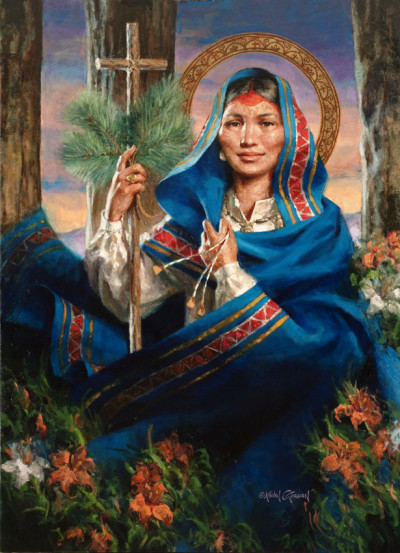
SAINT KATERI TEKAKWITHA: PRINCESS OF THE EUCHARIST
For many years, American Catholics who wanted to follow in the footsteps of a saint had to travel to Europe. In Assisi, they could step where Saint Francis did. In Ireland, they might walk the byways of Saint Patrick.
It wasn’t until the late-20th-century canonizations of Sister Elizabeth Ann Seton, born in New York City in 1774, and Sister Katharine Drexel, born in Philadelphia in 1858, that Americans finally had the opportunity to stay in the country when visiting places where U.S.-born saints lived and worked.
But the Big Apple and the City of Brotherly Love have changed significantly since the 18th and 19th centuries. In contrast, a virtually unspoiled place trod by a saint lies in upstate New York, thanks to the October 21 canonization of Kateri Tekakwitha, who walked and prayed in what is now the central part of the Empire State. In her time, it was the land of the Mohawks.
TRIBUTE TO THE NATIVE DAUGHTER
By making a trip to the Albany Diocese, people can visit two places associated with this Native American woman. The National Kateri Tekakwitha Shrine, located in Fonda, New York, and operated by the Conventual Franciscans, honors Saint Kateri’s baptismal site, while the Jesuit-run Shrine of Our Lady of Martyrs in Auriesville, New York, marks her birthplace.
The landscape where Kateri walked and prayed hasn’t changed, nor has the meaning of her life, according to Bishop Howard J. Hubbard of the Albany Diocese. Earlier this year, in the diocesan newspaper, The Evangelist, Bishop Hubbard paid tribute to the native daughter: “Despite the pristine simplicity of the civilization [Kateri] experienced and the rather drab ordinariness of her life, there are . . . some important lessons to be drawn from her pilgrim journey of faith,” he said.
First, she was “a woman who understood well and accepted with patient resignation the mystery of the Cross, that mystery which proclaims that our faith is founded on . . . the paradox of death leading to life; the paradox of suffering leading to glory; the paradox of defeat and failure leading to victory.”
Second, continued Bishop Hubbard, Saint Kateri was “a woman of magnificent fortitude, dogged determination, and unswerving conviction. A lesser person might well have yielded to the pressure . . . to squelch that thirst for the God of the Christians, which the Holy Spirit had so copiously stirred up in her heart.”
Finally, he said, Kateri was “a woman of great prayer, a woman who had a deep and abiding awareness of the Lord’s love for her and an ongoing personal relationship with him.”
COMMEMORATING THE CANONIZATION
Since its origin in 1847, the Albany Diocese has commemorated Kateri in several ways. Both the Knights of Columbus and the Catholic Daughters of the Americas have chapters dedicated to her. A diocesan program carries her name: Kateri Institute for Lay Ministry Formation. Most recently, two parishes that merged in Schenectady eschewed creating a portmanteau name from the titles of the former parishes and elected to become St. Kateri Church.
The two national shrines annually host multiple events that involve Native American Catholics. This year, the National Kateri Tekakwitha Shrine celebrated the saint’s feast day on July 14 with Native American rituals and songs. “I wanted to be in the place where she lived, where she was baptized, and where she is still honored,” said Eddie Ryder of Bay Shore, a town on Long Island. “I’m part Native American, and I’ve always wanted to come here and really feel Kateri’s presence.”
As Franciscan Father Mark Steed prepared to celebrate the feast-day Mass in a rustic pavilion on the shrine’s 200 acres of wooded land on the bank of the Mohawk River, he explained the significance of Kateri’s canonization for Native American Catholics. “It authenticates who they are as a people and who she was as an individual living all of those numbers of years ago,” he told Catholic News Service. “It gathers them in now to the whole Church. So they’re not sitting on the fringe. Now they are part of the inner circle.”
Four days later, more than 800 Native American Catholics from throughout North America flocked to the Albany Diocese to attend the 73rd annual Tekakwitha Conference. Holding the conference in Albany was a lucky stroke—or the intercession of a soon-to-be saint — because the event had been slated well before the canonization was announced. The conference, based in Great Falls, Montana, was started in 1939 as a way to unify Native American Catholics from different tribes across the United States.
Participants included members of the Mohawk, Choctaw, Algonquin, Navajo, Ojibwa, and other tribes. They listened to presentations ranging from the connection of Mother Earth and fracking to Native Catholic genealogy and a talk on Kateri as “a princess of the Eucharist.” Throughout the conference the smell of burning sweetgrass — known among native peoples as the “hair of Mother Earth” — wafted through Masses as congregants approached altars, offering corn, beans, and squash with the Eucharist.
Conference executive director Sister Kateri Mitchell, SSA, a Mohawk, said that the organization’s members, as well as other native peoples, routinely return to where the new saint was born and baptized because “there’s something intriguing about Kateri. She was born way back in the mid-17th century and died 24 years later. But in 2012, people still remember this Indian woman.”
WALKING ON HOLY GROUND
Sister Kateri’s own introduction to the new saint occurred when she was a child named Delia; she grew up on the St. Regis Mohawk Reservation, which straddles upstate New York and Canada. “My father would say on some mornings, ‘Let’s go back home.’ By ‘home,’ he meant the Mohawk Valley—Fonda and Auriesville,” she recalled. “He said that even though he had never lived there. The Mohawk people had not lived there for centuries. My father would tell the story of our people when we were there. It was like walking on holy ground.”
As the years passed, she came to love the shrines as much as her father did. “They attracted me,” she explained, and then echoed her father by saying, “It was like going home.”
Eventually, she entered religious life and chose Kateri as her name. When her order later permitted its members to return to their baptismal names, she consulted her parents. “My mother and father said, ‘Keep Kateri.’ It’s a very special name to me. I’m a Kateri more than a Delia.”
The uniqueness of the Kateri sites in upstate New York, she says, is that “they are so beautiful. Nature itself captivates you. People have told me they go there annually because they find a connection with nature and Kateri. It’s very peaceful and sacred. Saint Kateri calls people to deepen their own spiritual lives.”
In 1987, while visiting the United States, Pope John Paul II called Kateri “the best-known witness of Christian holiness among the native people of North America. . . . She always remained . . . a true daughter of her people, following her tribe in the hunting seasons and continuing her devotions in the environment most suited to her way of life, before a rough cross carved by herself in the forest. The Gospel of Jesus Christ, which is the great gift of God’s love, is never in contrast with what is noble and pure in the life of any tribe or nation, since all good things are his gifts.”
Sister Kateri believes that those good gifts include Saint Kateri and the land her people loved, where today’s Catholics can walk in her footsteps.
A SHORT HISTORY OF SAINT KATERI
When Kateri Tekakwitha was proclaimed Saint Kateri Tekakwitha on October 21, she became the first member of a North American tribe to be declared a saint. “The Lily of the Mohawks,” Kateri was born in 1656 in a village along the Mohawk River called Ossernenon, now known as Auriesville, New York. Her father was a Mohawk chief, her mother a Christian Algonquin raised among the French.
When Kateri was 4, a smallpox epidemic claimed her parents and baby brother. She survived, but her face was disfigured and her vision impaired. She was raised by her anti-Christian uncle, who began to plan her marriage. But after meeting with Catholic priests, Kateri decided to be baptized.
Following her Baptism by a Jesuit missionary in 1676 at age 20, Kateri’s family and village ostracized and ridiculed her. She fled the next year to Canada, taking refuge at St. Francis Xavier Mission in the Mohawk Nation at Caughnawaga on the St. Lawrence River, about 10 miles from Montreal, and made her first Communion on Christmas in 1677.
Kateri astounded the Jesuits with her deep spirituality and her devotion to the Blessed Sacrament. She took a private vow of virginity and devoted herself to teaching prayers to the children and helping the sick and elderly of Caughnawaga.
She died in 1680 at age 24. According to eyewitnesses, the scars on her face suddenly disappeared after her death. Soon after, Catholics started to claim that favors and miracles had been obtained through her intercession. Native Americans have made appeals to the Catholic Church for her recognition since at least the late 1800s.
Documentation for Kateri’s sainthood cause was sent to the Vatican in 1932. She was declared venerable in 1942 and in 1980 was beatified by Pope John Paul II.
Records for the final miracle needed for her canonization were sent to the Vatican in July 2009. It involved the full recovery of a young boy in Seattle whose face had been disfigured by flesh-eating bacteria and who almost died from the disease. His family, who is part Native American, had prayed for Kateri’s intercession. On December 19, 2011, Pope Benedict XVI signed the decree recognizing the miracle, clearing the way for Kateri’s canonization.
Written by: James Breig
111 notes
·
View notes